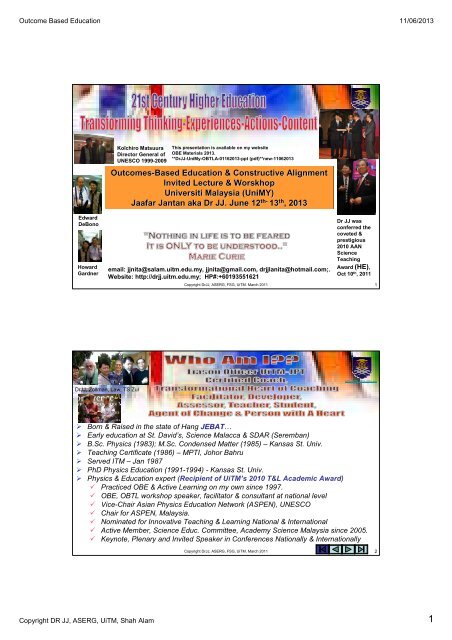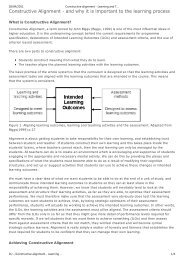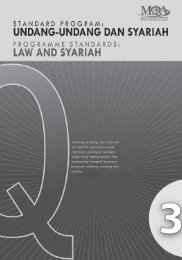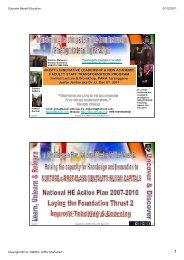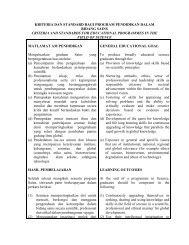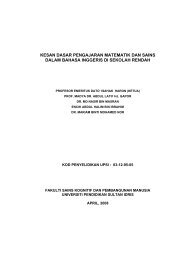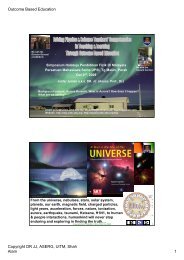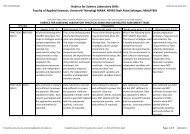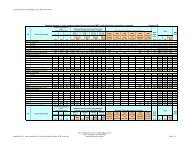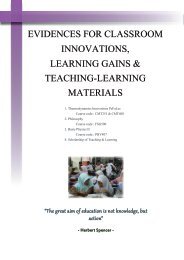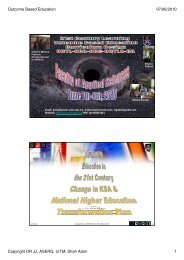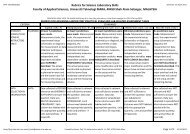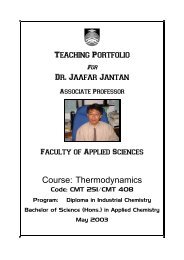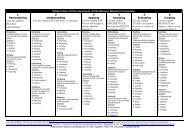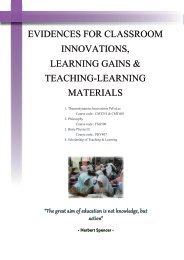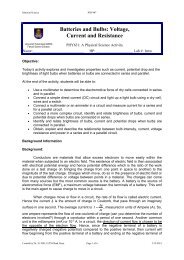DrJJ-UniMy-OBTLA-11062013-ppt (pdf) - UiTM
DrJJ-UniMy-OBTLA-11062013-ppt (pdf) - UiTM
DrJJ-UniMy-OBTLA-11062013-ppt (pdf) - UiTM
You also want an ePaper? Increase the reach of your titles
YUMPU automatically turns print PDFs into web optimized ePapers that Google loves.
Outcome Based Education 11/06/2013<br />
Koïchiro Matsuura<br />
Director General of<br />
UNESCO 1999-2009<br />
This presentation is available on my website<br />
OBE Materials 2013.<br />
**<strong>DrJJ</strong>-<strong>UniMy</strong>-<strong>OBTLA</strong>-01162013-<strong>ppt</strong> (<strong>pdf</strong>)**new-<strong>11062013</strong><br />
Outcomes-Based Education & Constructive Alignment<br />
Invited Lecture & Worskhop<br />
Universiti Malaysia (UniMY(<br />
UniMY)<br />
Jaafar Jantan aka Dr JJ. June 12 th- 13 th , 2013<br />
Edward<br />
DeBono<br />
Howard<br />
Gardner<br />
email: jjnita@salam.uitm.edu.my, jjnita@gmail.com, drjjlanita@hotmail.com;.<br />
Website: http://drjj.uitm.edu.my; HP#:+60193551621<br />
Dr JJ was<br />
conferred the<br />
coveted &<br />
prestigious<br />
2010 AAN<br />
Science<br />
Teaching<br />
Award (HE),<br />
Oct 10 th , 2011<br />
Copyright <strong>DrJJ</strong>, ASERG, FSG, <strong>UiTM</strong>. March 2011 1<br />
http://drjj.uitm.edu.my<br />
<strong>DrJJ</strong>, Zollman, Law, TS Zul<br />
Born & Raised in the state of Hang JEBAT…<br />
Early education at St. David’s, Science Malacca & SDAR (Seremban)<br />
B.Sc. Physics (1983); M.Sc. Condensed Matter (1985) – Kansas St. Univ.<br />
Teaching Certificate (1986) – MPTI, Johor Bahru<br />
Served ITM – Jan 1987<br />
PhD Physics Education (1991-1994) - Kansas St. Univ.<br />
Physics & Education expert (Recipient of <strong>UiTM</strong>’s 2010 T&L Academic Award)<br />
Practiced OBE & Active Learning on my own since 1997.<br />
OBE, OBTL workshop speaker, facilitator & consultant at national level<br />
Vice-Chair Asian Physics Education Network (ASPEN), UNESCO<br />
Chair for ASPEN, Malaysia.<br />
Nominated for Innovative Teaching & Learning National & International<br />
Active Member, Science Educ. Committee, Academy Science Malaysia since 2005.<br />
Keynote, Plenary and Invited Speaker in Conferences Nationally & Internationally<br />
Copyright <strong>DrJJ</strong>, ASERG, FSG, <strong>UiTM</strong>. March 2011 2<br />
Copyright DR JJ, ASERG, <strong>UiTM</strong>, Shah Alam 1
Outcome Based Education 11/06/2013<br />
http://drjj.uitm.edu.my<br />
GOAL (long term): Inspire & nurture Higher Education teachers to value<br />
and practice innovative and constructively aligned curriculum,<br />
learning-teaching activities and assessment approaches.<br />
Objective (what I will do): Describe the fundamentals; Concepts of<br />
learning, teaching, bridging the gap between what we want & what is the<br />
existing state, the science & art (craft) required in innovating constructively<br />
aligned TLAs<br />
Copyright <strong>DrJJ</strong>, ASERG, FSG, <strong>UiTM</strong>. March 2011 3<br />
http://drjj.uitm.edu.my<br />
Upon completion of this activity, you will be able to: (YOUR<br />
TAKE AWAY)<br />
1. Discuss the impact of 21st Century Learning & Malaysian quality<br />
assurance on your classroom practices.<br />
2. Explain the role of learning outcomes and curriculum mapping on your<br />
classroom teaching.<br />
3. Critically reflect the relevancy and appropriateness of your<br />
understanding of learning and teaching<br />
4. Critically review the existing course syllabus for alignment.<br />
5. Plan a constructively aligned lesson.<br />
6. Deliver an effective, meaningful and constructively aligned classroom<br />
teaching.<br />
Copyright <strong>DrJJ</strong>, ASERG, FSG, <strong>UiTM</strong>. March 2011 4<br />
Copyright DR JJ, ASERG, <strong>UiTM</strong>, Shah Alam 2
Outcome Based Education 11/06/2013<br />
http://drjj.uitm.edu.my<br />
“Life presents us & the graduates as<br />
as ill defined, complex,<br />
unreliable, , and contradictory with difficult practical problems and moral,<br />
social, and personal choices.<br />
Graduates need the capacity to identify and define<br />
problems, recognize reliable from unreliable information,<br />
analyze this information, and integrate it from diverse,<br />
often conflicting sources, making logical, concise<br />
arguments for or against specific positions...<br />
...”<br />
Richard J. Shavelson (2007). Assessing Student Learning Responsibly:<br />
From History to a Bodacious Proposal1. Stanford University. CHANGE magazine.<br />
http://www.changemag.org/Archives/Back%20Issues/January-February%202007/abstract-assessingresponsibly.html.<br />
Accessed July 3 rd , 2007.<br />
11/06/2013 Copyright <strong>DrJJ</strong>, ASERG, FSG, <strong>UiTM</strong>. March 2011 MQF-SciStd MQF<br />
5<br />
Education ACT 1996:<br />
Education in Malaysia is an on-going effort towards further developing<br />
the potential of individuals in a holistic and integrated manner, so<br />
as to produce individuals who are intellectually, spiritually,<br />
emotionally and physically balanced and harmonious based on a<br />
firm belief in and devotion to God. Such an effort is designed to produce<br />
Malaysian citizens who are knowledgeable and competent, who<br />
possess high moral standards and who are responsible and<br />
capable of achieving a high level of personal well-being as well<br />
as being able to contribute to the betterment of the family,<br />
society and the nation at large..<br />
Source: Curriculum Specifications Form 5 (2006). Integrated Curriculum for Secondary Schools.<br />
Curriculum Development Centre, Ministry of Education Malaysia.<br />
Copyright <strong>DrJJ</strong>, ASERG, FSG, <strong>UiTM</strong>. March 2011 6<br />
Copyright DR JJ, ASERG, <strong>UiTM</strong>, Shah Alam 3
Outcome Based Education 11/06/2013<br />
Education ACT 1996: For Higher Education<br />
Education in Malaysia is a continuous effort<br />
Purpose: develop individual’s s potential (existing potential)<br />
Method: holistic & integrated.<br />
Target: Balanced & hamonious Human capital.<br />
Intellect, emotion, spiritual, physical.<br />
Guiding Principle: Belief & devotion to GOD<br />
(existing potential).<br />
Ultimate target: Malaysian citizens who are knowledgeable, of<br />
noble/distinguished characters/morals, responsible, able to<br />
self-prosper and contribute to the harmony & prosperity of the<br />
family, society and country.<br />
Source: NATIONAL HIGHER EDUCATION ACTION PLAN 2007-2010;<br />
Triggering Higher Education Transformation AUGUST 27, 2007<br />
Copyright <strong>DrJJ</strong>, ASERG, FSG, <strong>UiTM</strong>. March 2011 7<br />
Copyright <strong>DrJJ</strong>, ASERG, FSG, <strong>UiTM</strong>. March 2011 8<br />
Copyright DR JJ, ASERG, <strong>UiTM</strong>, Shah Alam 4
Outcome Based Education 11/06/2013<br />
1 st class Mentality Human<br />
Capitals: Thinkers, visionary<br />
leaders, intellectuals,<br />
committed, confident, risk-<br />
takers<br />
3 rd class Mentality: Human<br />
Capitals: Having Potential to<br />
change, seriously thinking, can<br />
accept changes, begin to reflect<br />
one’s s abilities<br />
Source: NATIONAL HIGHER EDUCATION ACTION PLAN 2007-2010;<br />
Triggering Higher Education Transformation AUGUST 27, 2007<br />
Copyright <strong>DrJJ</strong>, ASERG, FSG, <strong>UiTM</strong>. March 2011 9<br />
MOHE’s Attributes of Human Capital with First-Class Mentality<br />
Knowledge Attributes:<br />
• Mastery of core subjects and<br />
ability to apply that knowledge<br />
• Mastery of Bahasa Malaysia and<br />
English, and at least one other<br />
global language.<br />
• A continuing passion for<br />
knowledge through lifelong<br />
learning.<br />
• Excellent general knowledge and<br />
interest in current events.<br />
• Appreciation of the arts, culture<br />
and sports.<br />
• Sound analytical and problem-<br />
solving skills.<br />
• Awareness of business and<br />
management principles, and<br />
technology.<br />
Personal Attributes:<br />
• Goal-oriented: proactive, self-<br />
starting, self- disciplined,<br />
confident, resilient,<br />
motivated, and fiercely<br />
competitive.<br />
• Intellectually engaging:<br />
creative, innovative, and<br />
possessing critical thinking<br />
skills.<br />
• Quick learner, adaptable,<br />
and flexible.<br />
• Entrepreneurial.<br />
• Ethically and morally<br />
upright.<br />
• Spiritually grounded.<br />
• Compassionate and caring<br />
(through volunteerism and<br />
social services).<br />
Interpersonal<br />
Attributes:<br />
• Able<br />
communicator<br />
and effective<br />
presenter.<br />
• Able to relate and<br />
be comfortable with<br />
people at all levels.<br />
• Able to develop<br />
and leverage on<br />
personal and<br />
professional<br />
networks to<br />
achieve goals.<br />
• Natural leader.<br />
• Team player.<br />
Copyright <strong>DrJJ</strong>, ASERG, FSG, <strong>UiTM</strong>. March 2011 10<br />
Copyright DR JJ, ASERG, <strong>UiTM</strong>, Shah Alam 5
Outcome Based Education 11/06/2013<br />
Copyright <strong>DrJJ</strong>, ASERG, FSG, <strong>UiTM</strong>. March 2011 11<br />
Reflect & communicate on the following tasks:<br />
Rate yourself in terms of factual, conceptual, procedural & functional knowledge of<br />
OBE-OBTL; 1-Novice, 2-Advanced 2<br />
beginner, 3-Competent, 3<br />
4-Proficient, 4<br />
5-Expert5<br />
What do you hope to achieve in this workshop. Why are you here-HONESTY Pls..<br />
!! Write down your goal and state at least 2 learning outcomes you intend to<br />
achieve.<br />
How do you intend to effectively & meaningfully achieve the outcomes<br />
!! List out your own committment in achieving the outcomes.-<br />
How can I facilitate your achievement of the intended outcomes<br />
!! List out 2 specific tasks and actions that you expect me to do in facilitating<br />
your achievement.<br />
http://drjj.uitm.edu.my<br />
Guidelines to perform the tasks<br />
• Individually, spend 5 minutes doing this task.<br />
• Pick a name for your learning community & a spokesperson.. Spend 3 minutes to<br />
discuss and conclude the learning group’s decision on each of the task above.<br />
• Verbally communicate with the learning community the decision of the group (or<br />
any alternative views).<br />
Copyright <strong>DrJJ</strong>, ASERG, FSG, <strong>UiTM</strong>. March 2011 12<br />
Copyright DR JJ, ASERG, <strong>UiTM</strong>, Shah Alam 6
Outcome Based Education 11/06/2013<br />
http://drjj.uitm.edu.my<br />
11/06/2013 Copyright <strong>DrJJ</strong>, ASERG, FSG, <strong>UiTM</strong>. March 2011 13<br />
"He who rejects change is the architect of decay.<br />
The only human institution which rejects progress is the<br />
cemetery."<br />
Harold WIlson, Prime Minister. NYT, Jan 24th, 1967. page 12<br />
A wise man is not governed by others, nor<br />
does he try to govern them;<br />
he prefers that reason alone prevail<br />
~La Bruyère, Characters, 1688<br />
Copyright <strong>DrJJ</strong>, ASERG, FSG, <strong>UiTM</strong>. March 2011 14<br />
Copyright DR JJ, ASERG, <strong>UiTM</strong>, Shah Alam 7
Outcome Based Education 11/06/2013<br />
11/06/2013 Copyright <strong>DrJJ</strong>, ASERG, FSG, <strong>UiTM</strong>. March 2011 15<br />
Developing 3 Domains of Education-Learn<br />
Cognitive<br />
Affective<br />
Heart<br />
Feeling, The Heart<br />
The CARE, Emotions<br />
The way to RESPOND<br />
Head<br />
Knowing, the Head<br />
The KNOWLEDGE (F,C,P)<br />
Intellectual Skills (FC)<br />
Reasoning Skills-Evidences<br />
http://drjj.uitm.edu.my<br />
Psychomotor<br />
Hand, Body<br />
Hand, Body<br />
Doing, The<br />
Doing, The Hand<br />
Hand<br />
The SKILLS, PRECISE &<br />
The SKILLS<br />
ACCURATE ACTIONS<br />
(3+1)H<br />
11/06/2013 Copyright <strong>DrJJ</strong>, ASERG, FSG, <strong>UiTM</strong>. March 2011 16<br />
Copyright DR JJ, ASERG, <strong>UiTM</strong>, Shah Alam 8
Outcome Based Education 11/06/2013<br />
http://drjj.uitm.edu.my<br />
Can explain: provide thorough, supported, and justifiable accounts<br />
of phenomena, facts, and data.<br />
Can interpret: tell meaningful stories; offer apt translations; provide<br />
a revealing historical or personal dimension to ideas and events;<br />
make it personal or accessible through images, anecdotes,<br />
analogies, and models.<br />
Can apply: effectively use and adapt what we know in diverse<br />
contexts.<br />
Have perspective: see and hear points of view through critical eyes<br />
and ears; see the big picture.<br />
Source: Grant Wiggins and Jay McTighe. Understanding by Design; Chap 4.<br />
11/06/2013<br />
Copyright <strong>DrJJ</strong>, ASERG, FSG, <strong>UiTM</strong>. March 2011 17<br />
http://drjj.uitm.edu.my<br />
Sternberg suggests Curriculum must develop the other 3 R’s.<br />
• Reasoning (analyze, criticize, solve, propose, develop)<br />
• which include analytical, critical thinking, and problem solving skills<br />
• Resilience (persistence)<br />
• which encompasses life skills such as flexibility, adaptability, and<br />
self-reliance<br />
• Responsibility<br />
• wisdom, i.e. “the application of intelligence, creativity, and<br />
knowledge for a common good.”<br />
Sternberg, R. & Subotnik, R., eds. (2006). Optimizing Student Success with the Other Three Rs:<br />
Reasoning, Resilience, and Responsibility. Greenwich, CT: Information Age Publishing.<br />
11/06/2013<br />
Copyright <strong>DrJJ</strong>, ASERG, FSG, <strong>UiTM</strong>. March 2011 18<br />
Copyright DR JJ, ASERG, <strong>UiTM</strong>, Shah Alam 9
Outcome Based Education 11/06/2013<br />
Learning is<br />
what students know (factual, conceptual, procedural & metacognitive<br />
knowledge) - growth in the knowledge dimensions.<br />
what they can do with what they know (functional knowledge) –<br />
cognitive dimension process.<br />
Attitudes – making choices – how we respond.<br />
Skills-acting on choices with precision.<br />
11/06/2013<br />
The 21 st Century MUST HAVE skills:<br />
http://drjj.uitm.edu.my<br />
“Learning should be relevant to the variety of graduates ‘roles included<br />
in their working, civic and personal life.” Transformational OBE<br />
“It is an emphasis on what students can do with knowledge, rather than<br />
what units of knowledge they have, , that best describes the essence of<br />
21st century skills.” – attaining learning outcomes<br />
Elena Silva in the Education Sector Report 2008<br />
Copyright <strong>DrJJ</strong>, ASERG, FSG, <strong>UiTM</strong>. March 2011 19<br />
11/06/2013<br />
Copyright <strong>DrJJ</strong>, ASERG, FSG, <strong>UiTM</strong>. March 2011 20<br />
Copyright DR JJ, ASERG, <strong>UiTM</strong>, Shah Alam 10
Outcome Based Education 11/06/2013<br />
http://drjj.uitm.edu.my<br />
Outcomes-Based<br />
Curriculum Interdisciplinary<br />
Project-based<br />
Research-driven<br />
Thematic & NOT textbook-driven<br />
(textbook as a resource)<br />
Connected to community<br />
Incorporates<br />
Bloom’s s HOTS<br />
Multiple Intelligences<br />
Learning Preferences<br />
Technology & multimedia<br />
Multiple literacy<br />
Authentic Assessment (tasks)<br />
Students work independently &<br />
interdependently<br />
Knowledge is<br />
constructed through research<br />
and application, and connected<br />
to previous knowledge, personal<br />
experience, , interests, talents<br />
and passions<br />
is NOT memorization of facts<br />
Assessment is<br />
demonstration of understanding<br />
through application in a variety<br />
of contexts<br />
NOT REGURGITATION<br />
By self, peer & facilitators<br />
By multiple ATs to show<br />
achievement of CLOs<br />
By using holistic rubrics<br />
11/06/2013<br />
Copyright <strong>DrJJ</strong>, ASERG, FSG, <strong>UiTM</strong>. March 2011 21<br />
Quiz: Recognize & Match the Music types shown in each<br />
graphic: Heavy Metal, Stevie Wonder, Gangsta Rap,<br />
House, Hip-hop<br />
Techno (with<br />
Ecstacy)<br />
11/06/2013 Copyright <strong>DrJJ</strong>, ASERG, FSG, <strong>UiTM</strong>. March 2011 22<br />
Copyright DR JJ, ASERG, <strong>UiTM</strong>, Shah Alam 11
Outcome Based Education 11/06/2013<br />
http://drjj.uitm.edu.my<br />
If you are, you breath.<br />
If you breath, you talk.<br />
If you talk, you ask.<br />
If you ask, you think.<br />
If you think, you search.<br />
If you search, you experience.<br />
If you experience, you learn.<br />
If you learn, you grow.<br />
If you grow, you wish.<br />
If you wish, you find.<br />
If you understand, you know.<br />
If you know, you want to know more…<br />
And if you want to know more,<br />
If you find, , you doubt.<br />
If you doubt, you question.<br />
If you question, you understand.<br />
And if you want to know more, you are alive.<br />
Video courtesy of National Geographic Channel<br />
11/06/2013<br />
Copyright <strong>DrJJ</strong>, ASERG, FSG, <strong>UiTM</strong>. March 2011 23<br />
11/06/2013<br />
Copyright <strong>DrJJ</strong>, ASERG, FSG, <strong>UiTM</strong>. March 2011 24<br />
Copyright DR JJ, ASERG, <strong>UiTM</strong>, Shah Alam 12
Outcome Based Education 11/06/2013<br />
• Point of reference & joint understanding of HE Qualifications in<br />
Malaysia<br />
• An instrument that<br />
• develops and classifies qualifications based on a set of criteria<br />
that are approved nationally and benchmarked against<br />
international best practices,<br />
• and which clarifies the earned academic levels, , learning<br />
outcomes of study areas and credit system based on student<br />
academic load (Student Learning Time, SLT).<br />
• These criteria are accepted and used for all qualifications awarded by<br />
recognised higher education providers. Hence, MQF integrates with<br />
and links all national qualifications.<br />
MQF<br />
11/06/201<br />
3<br />
Copyright <strong>DrJJ</strong>, ASERG, FSG, <strong>UiTM</strong>. March 2011 25<br />
http://drjj.uitm.edu.my<br />
11/06/2013<br />
Copyright <strong>DrJJ</strong>, ASERG, FSG, <strong>UiTM</strong>. March 2011 26<br />
Copyright DR JJ, ASERG, <strong>UiTM</strong>, Shah Alam 13
Outcome Based Education 11/06/2013<br />
http://drjj.uitm.edu.my<br />
MQF LOs Domains MOHE LOs, 2009-KSA<br />
1. Knowledge (K)<br />
2. Practical skills (S)<br />
3. Social skills and responsibilities (S)<br />
4. Ethics, professionalism and<br />
humanities (A)<br />
5. Communication, leadership and<br />
team skills (A)<br />
6. Scientific methods, critical thinking<br />
and problem solving skills (K)<br />
7. Lifelong learning and information<br />
management (A)<br />
8. Entrepreneurship and managerial<br />
skills (A)<br />
1. Knowledge (K)<br />
2. Practical Skills (S)<br />
3. Thinking and scientific skills (K)<br />
4. Communication skills (A/S)<br />
5. Social skills, teamwork and responsibility<br />
(A/S)<br />
6. Values, ethics, moral and professionalism (A)<br />
7. Information management and lifelong learning<br />
skills (A/S)<br />
8. Managerial and entrepreneurial skills (A/S)<br />
9. Leadership skills (A/S)<br />
11/06/2013<br />
Copyright <strong>DrJJ</strong>, ASERG, FSG, <strong>UiTM</strong>. March 2011 27<br />
Professional skills<br />
1. Critical thinking and problem solving skills (C)-LO3)<br />
2. Communication skills (A)-LO4<br />
3. Group working skills (A)-LO5<br />
4. Ethics and professionalism (A)-LO6<br />
5. Lifelong learning and information management (A)-LO7<br />
6. Entrepreneurship skills (A)-LO8<br />
7. Leadership skills (A)-LO9<br />
11/06/2013<br />
Copyright <strong>DrJJ</strong>, ASERG, FSG, <strong>UiTM</strong>. March 2011 28<br />
Copyright DR JJ, ASERG, <strong>UiTM</strong>, Shah Alam 14
Outcome Based Education 11/06/2013<br />
MQA Code of Practice<br />
Good Practices:<br />
MQA<br />
Code of<br />
Practice<br />
….the quality assurance process is built on the following<br />
attributes:<br />
encourages a variety of teaching and learning methods<br />
ensures the choice of credible student assessment methods<br />
appropriate for the teaching and learning methods chosen;<br />
ensures there are adequate resources to deliver the curriculum;<br />
is concerned with good outcomes rather than detailed<br />
specifications of content<br />
11/06/201<br />
3<br />
Copyright <strong>DrJJ</strong>, ASERG, FSG, <strong>UiTM</strong>. March 2011 29<br />
Copyright DR JJ, ASERG, <strong>UiTM</strong>, Shah Alam 15
Outcome Based Education 11/06/2013<br />
http://drjj.uitm.edu.my<br />
MQF has 8 levels of certification - levels of capabilities<br />
Generic features & capabilities between levels of certifications<br />
MQF<br />
11/06/201<br />
3<br />
Copyright <strong>DrJJ</strong>, ASERG, FSG, <strong>UiTM</strong>. March 2011 31<br />
http://drjj.uitm.edu.my<br />
11/06/2013<br />
Copyright <strong>DrJJ</strong>, ASERG, FSG, <strong>UiTM</strong>. March 2011 32<br />
Copyright DR JJ, ASERG, <strong>UiTM</strong>, Shah Alam 16
Outcome Based Education 11/06/2013<br />
Copyright <strong>DrJJ</strong>, ASERG, FSG, <strong>UiTM</strong>. March 2011 33<br />
http://drjj.uitm.edu.my<br />
Your TASK:<br />
Invidually, reflect and respond to the following questions. When done, engage with other<br />
group members.<br />
Share your reflections with the rest of the learning community. Time on task: 10 mins.<br />
1. WHY OBE What's wrong with the existing education philosophy<br />
2. Is OBE an approach to education or a prescription to program structure<br />
3. How is OBE related to 21st Century Learning characteristics<br />
4. How do these characteristics impact our existing classroom practices<br />
5. What is the role of MQA in OBE Explain.<br />
Copyright <strong>DrJJ</strong>, ASERG, FSG, <strong>UiTM</strong>. March 2011 34<br />
Copyright DR JJ, ASERG, <strong>UiTM</strong>, Shah Alam 17
Outcome Based Education 11/06/2013<br />
http://drjj.uitm.edu.my<br />
11/06/2013<br />
Copyright <strong>DrJJ</strong>, ASERG, FSG, <strong>UiTM</strong>. March 2011 35<br />
Philosophy of OBE-OBTL<br />
1. WHY OBE What's wrong with the existing education philosophy<br />
2. Is OBE an approach to education or a prescription to program structure<br />
3. What are the 21st Century Learning characteristics<br />
4. How do these characteristics impact our existing classroom practices<br />
5. What is the role of MQA in OBE Explain.<br />
http://drjj.uitm.edu.my<br />
How DO Programs Support Vision & Mission of IHL<br />
1. Why are PEOs developed<br />
2. What is the acceptable number for PEOs Explain<br />
3. What are the attributes that must be embedded in PEOs<br />
4. What are the PEOs communicating to the stakeholders (academic staff,<br />
students, parents, industry players)<br />
5. How should the PEOs be formulated<br />
Copyright <strong>DrJJ</strong>, ASERG, FSG, <strong>UiTM</strong>. March 2011 36<br />
Copyright DR JJ, ASERG, <strong>UiTM</strong>, Shah Alam 18
Outcome Based Education 11/06/2013<br />
How to Design Curriculum to Support PEOs Attainment<br />
http://drjj.uitm.edu.my<br />
1. What are PLOs<br />
2. Why PLOs<br />
3. How many and why<br />
4. What is the difference between PLOs & PEOs<br />
5. How are PLOs related to PEOs Explain.<br />
6. What are the verbs most appropriate to be used in each PLO What does<br />
the verb tell you<br />
7. Given a set of PEOs, PLOs, its matrix, a curriculum matrix, the taxonomy<br />
matrix and the KI matrix, can you critically review them based on<br />
fundamental principles of OBE curriculum design<br />
8. What is the significance of Bloom's original taxonomy, the revised<br />
taxonomy, Simpson's taxonomy and Krathwol taxonomy<br />
9. How would I know that my program has serve its purpose What Purpose<br />
10. How should I convince my stakeholders<br />
Copyright <strong>DrJJ</strong>, ASERG, FSG, <strong>UiTM</strong>. March 2011 37<br />
MQA<br />
Code of<br />
Practice<br />
6/11/2013 Copyright <strong>DrJJ</strong>, ASERG, FSG, <strong>UiTM</strong>. March 2011 38<br />
Copyright DR JJ, ASERG, <strong>UiTM</strong>, Shah Alam 19
Outcome Based Education 11/06/2013<br />
Traditional/Transitional OBE emphasises student mastery of<br />
traditional subject-related academic outcomes (usually with a strong<br />
focus on subject-specific specific content) and some cross-discipline<br />
outcomes (such as the ability to solve problems or to work co-<br />
operatively).<br />
Transformational OBE emphasises long-term, cross-curricular<br />
curricular<br />
outcomes that are related directly to students’ future life roles (such<br />
as being a productive worker or a responsible citizen or a parent).<br />
Spady (1994)<br />
Source: Killen, Roy (2005). Programming and assessment for quality teaching and<br />
learning. Chapter 2. Thomson Social Science Press<br />
http://drjj.uitm.edu.my<br />
Outcomes-Based Education (OBE)<br />
is a philosophy, an approach to<br />
education based on products of<br />
learning experiences<br />
Involved Every<br />
stakeholders of<br />
higher education<br />
Integrates Constructively Aligned<br />
TLAs, , Assessment & Grading to the<br />
Finished Product, the Learning<br />
Outcomes<br />
Prepares<br />
graduates as<br />
knowledgeable<br />
& responsible<br />
citizens<br />
Copyright <strong>DrJJ</strong>, ASERG, FSG, <strong>UiTM</strong>. March 2011 40<br />
Copyright DR JJ, ASERG, <strong>UiTM</strong>, Shah Alam 20
Outcome Based Education 11/06/2013<br />
http://drjj.uitm.edu.my<br />
The Outcomes-Based approach to course design is intended to make the<br />
expectations of the designer/educator more<br />
transparent to both the student and any<br />
regulatory or accrediting body (KPT, MQA, EAC).<br />
Unlike the traditional model of course design in higher education<br />
(focus on coverage),<br />
), where the lecturer would decide what to include on<br />
a syllabus, based on his or her own judgement of what was important for<br />
students to know; or on personal research or other interests;<br />
the outcomes-based approach starts with a specification of what the<br />
student will be expected to achieve (significant learning) by<br />
student will be expected to achieve<br />
the end of the program/course/unit/lesson<br />
/lesson<br />
11/06/2013<br />
Copyright <strong>DrJJ</strong>, ASERG, FSG, <strong>UiTM</strong>. March 2011 41<br />
http://drjj.uitm.edu.my<br />
"Learning outcomes represent<br />
culminating demonstrations of learning and achievement.<br />
They are not simply a listing of discrete skills, nor<br />
broad statements of knowledge and comprehension.<br />
They describe performances that demonstrate that<br />
significant learning has been verified and achieved by<br />
graduates of the program."<br />
A description of the Competency for the KSA attainment<br />
appropriate of university graduates.<br />
LOs: Describe<br />
events on a bus<br />
LOs: Imitate the hop,<br />
jump and leap<br />
11/06/2013<br />
Copyright <strong>DrJJ</strong>, ASERG, FSG, <strong>UiTM</strong>. March 2011 42<br />
Copyright DR JJ, ASERG, <strong>UiTM</strong>, Shah Alam 21
Outcome Based Education 11/06/2013<br />
http://drjj.uitm.edu.my<br />
MQF<br />
11/06/201<br />
3<br />
Copyright <strong>DrJJ</strong>, ASERG, FSG, <strong>UiTM</strong>. March 2011 43<br />
http://drjj.uitm.edu.my<br />
11/06/2013<br />
Copyright <strong>DrJJ</strong>, ASERG, FSG, <strong>UiTM</strong>. March 2011 44<br />
Copyright DR JJ, ASERG, <strong>UiTM</strong>, Shah Alam 22
Outcome Based Education 11/06/2013<br />
Copyright <strong>DrJJ</strong>, ASERG, FSG, <strong>UiTM</strong>. March 2011 45<br />
Copyright <strong>DrJJ</strong>, ASERG, FSG, <strong>UiTM</strong>. March 2011 46<br />
Copyright DR JJ, ASERG, <strong>UiTM</strong>, Shah Alam 23
Outcome Based Education 11/06/2013<br />
http://drjj.uitm.edu.my<br />
11/06/2013<br />
Copyright <strong>DrJJ</strong>, ASERG, FSG, <strong>UiTM</strong>. March 2011 47<br />
http://drjj.uitm.edu.my<br />
Copyright <strong>DrJJ</strong>, ASERG, FSG, <strong>UiTM</strong>. March 2011 48<br />
Copyright DR JJ, ASERG, <strong>UiTM</strong>, Shah Alam 24
Outcome Based Education 11/06/2013<br />
http://drjj.uitm.edu.my<br />
A programme’s s stated aims, , objectives and learning outcomes reflect what it<br />
wants the learner to achieve. It is crucial for these aims, objectives and learning<br />
outcomes to be expressed explicitly and be made known to learners and other<br />
stakeholders alike.<br />
Programme Aims<br />
Programme aim/s is an overarching statement on the purpose, philosophy and<br />
rationale in offering the programme.<br />
Benchmarked Standard (pp 25)<br />
• The programme objectives must reflect the key elements of the outcomes of<br />
higher education that are in line with national and global developments<br />
opments.<br />
• The programme aims, objectives and learning outcomes must be developed in<br />
consultation with principal stakeholders which should include the academic staff.<br />
• The programme aims, objectives and learning outcomes must be consistent with,<br />
and supportive of, the HEP’s vision and mission.<br />
COPPA<br />
EAC ABET WA<br />
Copyright <strong>DrJJ</strong>, ASERG, FSG, <strong>UiTM</strong>. March 2011 49<br />
http://drjj.uitm.edu.my<br />
Vision<br />
To establish <strong>UiTM</strong> as a premier university of outstanding<br />
scholarship and academic excellence capable of providing leadership to<br />
Bumiputeras’s s dynamic involvement in all professional fields of world-class<br />
standards in order to produce globally competitive graduates of sound ethical<br />
standing.<br />
Mission<br />
To enhance the knowledge and expertise of Bumiputeras in all fields<br />
of study through professional programmes, research work and community service<br />
based on moral values and professional ethics<br />
EAC ABET WA<br />
Copyright <strong>DrJJ</strong>, ASERG, FSG, <strong>UiTM</strong>. March 2011 50<br />
Copyright DR JJ, ASERG, <strong>UiTM</strong>, Shah Alam 25
Outcome Based Education 11/06/2013<br />
http://drjj.uitm.edu.my<br />
Vision: Become an Eminent Management University<br />
pre-eminent eminent centre of academic excellence<br />
in teaching and learning in the field of management<br />
Consistently be a pre<br />
pre-eminent eminent centre of academic excellence in<br />
research, consultancy, and publication in the field of management,<br />
Consistently be a pre<br />
Mission Statement:<br />
Consistently bring forth highly competent human capital that is<br />
commited to serving in the development of the nation and all<br />
humanity.<br />
Note: The bullets were extracted by Dr JJ from UUM official mission statement<br />
Source: http://www.uum.org.my/en/vision-and-mission<br />
Copyright <strong>DrJJ</strong>, ASERG, FSG, <strong>UiTM</strong>. March 2011 51<br />
http://drjj.uitm.edu.my<br />
VISION<br />
Enriching the best brains with a learning experience to<br />
enable them to get to the future faster<br />
MISSION<br />
To enroll, educate and inspire the brightest students<br />
with a passion for learning to become the next<br />
generation of creative thinkers, responsible<br />
entrepreneurs and technology leaders in a global<br />
society<br />
EAC ABET WA<br />
Copyright <strong>DrJJ</strong>, ASERG, FSG, <strong>UiTM</strong>. March 2011 52<br />
Copyright DR JJ, ASERG, <strong>UiTM</strong>, Shah Alam 26
Outcome Based Education 11/06/2013<br />
http://drjj.uitm.edu.my<br />
The IT Baccalaureate program aims to<br />
support Malaysia’s aspirations of becoming an<br />
industrialized nation by producing globally<br />
recognized IT graduates with unwavering<br />
commitment and professionalism while critically<br />
and creatively provide solutions that are<br />
relevant to societal and Malaysia’s economic<br />
growth.<br />
COPPA<br />
EAC ABET WA<br />
Copyright <strong>DrJJ</strong>, ASERG, FSG, <strong>UiTM</strong>. March 2011 53<br />
http://drjj.uitm.edu.my<br />
Universiti Teknologi MARA’s Diploma/<br />
Baccalaureate Music program aims to support<br />
Malaysia’s aspirations of becoming an<br />
industrialized nation by nurturing world-class<br />
bumiputra music professionals with unwavering<br />
integrity and commitment in critically and<br />
creatively providing ethical and responsible<br />
solutions that are relevant to 1Malaysia’s societal<br />
and economic growth.<br />
COPPA<br />
EAC ABET WA<br />
Copyright <strong>DrJJ</strong>, ASERG, FSG, <strong>UiTM</strong>. March 2011 54<br />
Copyright DR JJ, ASERG, <strong>UiTM</strong>, Shah Alam 27
Outcome Based Education 11/06/2013<br />
http://drjj.uitm.edu.my<br />
Taxonomies of<br />
Learning<br />
LOKI Guide<br />
Bloom<br />
Copyright <strong>DrJJ</strong>, ASERG, FSG, <strong>UiTM</strong>. March 2011 55<br />
http://drjj.uitm.edu.my<br />
ABET’s s definition of PEOs:<br />
The program must have published Program Educational Objectives that are<br />
consistent with the mission of the institution, the needs of the<br />
program’s s various constituencies, and these criteria.<br />
There must be a documented and effective process, involving program<br />
constituencies, for the periodic review and revision of these program<br />
educational objectives.<br />
EAC’s definition<br />
Programme Objectives are specific goals consistent with the mission<br />
and vision of the IHL, that are responsive to the expressed interest of<br />
programme stakeholders, describing the expected achievements of<br />
graduates in their career and professional life few years after<br />
graduation.<br />
COPPA<br />
EAC ABET WA<br />
Copyright <strong>DrJJ</strong>, ASERG, FSG, <strong>UiTM</strong>. March 2011 56<br />
Copyright DR JJ, ASERG, <strong>UiTM</strong>, Shah Alam 28
Outcome Based Education 11/06/2013<br />
http://drjj.uitm.edu.my<br />
specific goals consistent with & supportive of the mission and vision v<br />
of the IHL<br />
reflect the key elements of higher education (knowledge,(<br />
skills &<br />
responses)<br />
in line with the national & global developments (contains the 9 MOHE<br />
LO domains or 8 MQF LO domains)<br />
responsive to the expressed interest of programme stakeholders and a<br />
describing the expected achievements or milestone of graduates in i<br />
their career and professional life few years after graduation<br />
employability attributes and selling points of your program. The<br />
sentences begin with: (Within) Within a few years upon successful<br />
completion the program, our graduates (are) will be….<br />
COPPA<br />
EAC ABET WA<br />
Copyright <strong>DrJJ</strong>, ASERG, FSG, <strong>UiTM</strong>. March 2011 57<br />
http://drjj.uitm.edu.my<br />
TCM Health EAC Eng Tech ABET WA<br />
MQA-Std-Business<br />
Generic Program Educational Objectives (PEOs are employability attributes and selling<br />
points of your program) for FSG Pre Diploma Programs. The sentences begin with<br />
Within few years upon successfully completing the program, our graduates (are) will be:<br />
1. Bumiputra higher education students who deepens their knowledge and understanding of<br />
science concepts, laws, principles and laboratory experiences in their field of study.<br />
2. Bumiputra higher education students who collaborate in teams and enhance leadership roles<br />
in learning by utilizing proficient verbal and writing abilities to solve problems in their field of<br />
study.<br />
3. Bumiputra higher education students who enhance their self-learning abilities and their<br />
proficiency of using the internet and information communication technology to explore new<br />
ways of learning in their field of study.<br />
4. Bumiputra higher education students who demonstrate academic integrity and moral values<br />
in completing their academic and college learning tasks.<br />
Task<br />
Copyright <strong>DrJJ</strong>, ASERG, FSG, <strong>UiTM</strong>. March 2011 58<br />
Copyright DR JJ, ASERG, <strong>UiTM</strong>, Shah Alam 29
Outcome Based Education 11/06/2013<br />
http://drjj.uitm.edu.my<br />
Generic Program Educational Objectives (PEOs are employability attributes and selling<br />
points of your program) for FSG Diploma Programs. The sentences begin with<br />
Within few years upon successfully completing the program, our graduates (are) will be:<br />
1. semiprofessionals in applied sciences who analyze and apply the knowledge,<br />
understanding and laboratory experiences to provide quality products and services to<br />
the government agencies and science-related industries.<br />
2. semiprofessionals in applied sciences who lead and engage in teams in problem<br />
solving tasks across disciplines through effective communicative abilities<br />
3. semiprofessionals in applied sciences who continue to advance their knowledge and<br />
abilities by utilizing ICT to explore business opportunities in the science-related<br />
industry<br />
4. semiprofessionals in applied sciences who demonstrate ethical and professional<br />
values in providing services to the recipients and provider of the science-related<br />
industry.<br />
Task<br />
TCM Health EAC Eng Tech ABET WA<br />
MQA-Std-Business<br />
Copyright <strong>DrJJ</strong>, ASERG, FSG, <strong>UiTM</strong>. March 2011 59<br />
http://drjj.uitm.edu.my<br />
TCM Health EAC Eng Tech ABET WA<br />
MQA-Std-Business<br />
Program Educational Objectives (PEOs are employability attributes and selling points of<br />
your program) for UniMY Foundation Program.<br />
1. Students have strong knowledge in the field of electronics, computing and<br />
information technologies<br />
2. Attain knowledge of contemporary issues in technology through research and lifelong<br />
learning activities.<br />
3. Ability to function as an effective team player with the capability to lead and<br />
appreciate team work and leadership qualities.<br />
4. Appreciate and uphold professional attitudes and ethics necessary in fulfilling their<br />
responsibilities towards the Almighty, clients and the society.<br />
Task<br />
Copyright <strong>DrJJ</strong>, ASERG, FSG, <strong>UiTM</strong>. March 2011 60<br />
Copyright DR JJ, ASERG, <strong>UiTM</strong>, Shah Alam 30
Outcome Based Education 11/06/2013<br />
http://drjj.uitm.edu.my<br />
Copyright <strong>DrJJ</strong>, ASERG, FSG, <strong>UiTM</strong>. March 2011 61<br />
http://drjj.uitm.edu.my<br />
What should graduating students know & be able to do<br />
upon successful completion of the program<br />
Will these be enough to support attainment of the<br />
Program Educational Objectives<br />
Copyright <strong>DrJJ</strong>, ASERG, FSG, <strong>UiTM</strong>. March 2011 62<br />
Copyright DR JJ, ASERG, <strong>UiTM</strong>, Shah Alam 31
Outcome Based Education 11/06/2013<br />
http://drjj.uitm.edu.my<br />
MQF<br />
Copyright <strong>DrJJ</strong>, ASERG, FSG, <strong>UiTM</strong>. March 2011 63<br />
MQF Framework for Diploma level-Outcomes: Median C3,P4, A3<br />
http://drjj.uitm.edu.my<br />
MQF<br />
Copyright <strong>DrJJ</strong>, ASERG, FSG, <strong>UiTM</strong>. March 2011 64<br />
Copyright DR JJ, ASERG, <strong>UiTM</strong>, Shah Alam 32
Outcome Based Education 11/06/2013<br />
TCM Health EAC Eng Tech ABET WA<br />
MQA-Std-Business<br />
http://drjj.uitm.edu.my<br />
PLOs are what graduates will know and be able to do (upon successfully completing the<br />
program) to support attainment of PEOs. It is the minimum, practical & attainable<br />
competency level. The sentences begin with<br />
Upon successfully completing the program, our bumiputra graduates will be able:<br />
1. Demonstrate knowledge and understanding of music (for example: music<br />
performance, historical studies, cultural studies, musicianship and music theories)<br />
and …….<br />
2. Apply knowledge and understanding of ….. (music performance, historical studies,<br />
cultural studies, musicianship and music theories).<br />
3. Display music competency skills including the use of music notation in reading,<br />
performing, composing, analyzing, and hearing music.;<br />
4. Critically analyze musical performance, musical composition and formulate solutions<br />
to music-related well-defined (vaguely-defined; broadly-defined) problems;<br />
Example of the first 3/4 Music LOs. Standards will follow the MQF certification level<br />
(refer to the MQF generic LOs for diploma or degree). The rest can be adopted from<br />
other sources (generic attributes) or from MQF.<br />
Copyright <strong>DrJJ</strong>, ASERG, FSG, <strong>UiTM</strong>. March 2011 65<br />
TCM Health EAC Eng Tech ABET WA<br />
MQA-Std-Business<br />
http://drjj.uitm.edu.my<br />
Generic Program Learning Outcomes (PLOs are what graduates will know and be able to<br />
do to attain PEOs) for FSG Pre-Diploma Programs. The sentences begin with<br />
Upon successfully completing the program, our bumiputra graduates will be able to:<br />
1. Construct and acquire introductory and intermediate knowledge of science and<br />
mathematics at the Diploma level.<br />
2. Plan and safely conduct simple scientific investigations, organize and transform raw data<br />
into tables and graphs and propose appropriate mathematical models from the evidence of the<br />
investigations.<br />
3. Identify, classify and make clear the outcomes and procedures to solve ill-defined problems<br />
found in an introductory undergraduate science-related textbook.<br />
4. Communicate their ideas and arguments proficiently both verbally and in writing.<br />
5. Demonstrate collaboration with team members across gender and ethnic background while<br />
performing and completing academic tasks.<br />
6. Practice honesty and integrity in performing and completing their academic tasks.<br />
7. Demonstrate abilities to be independent in completing their academic tasks.<br />
8. Explore new and efficient strategies to become deep-learners.<br />
9. Demonstrate leadership abilities in completing a team-related academic tasks<br />
MQF LOs<br />
Degree<br />
Copyright <strong>DrJJ</strong>, ASERG, FSG, <strong>UiTM</strong>. March 2011 66<br />
Copyright DR JJ, ASERG, <strong>UiTM</strong>, Shah Alam 33
Outcome Based Education 11/06/2013<br />
TCM Health EAC Eng Tech ABET WA<br />
MQA-Std-Business<br />
http://drjj.uitm.edu.my<br />
Generic Program Learning Outcomes (PLOs are what graduates will know and be able to<br />
do to attain PEOs) for FSG Diploma Programs. The sentences begin with<br />
Upon successful completion of the program, our bumiputra graduates will be able to:<br />
1. Apply knowledge and understanding of science and mathematics (& engineering).<br />
2. Safely prepare samples and operate a range of machineries and laboratory equipments.<br />
3. Plan, conduct and conclude scientific investigations in their field of study.<br />
4. Apply the scientific reasoning in proposing solutions for authentic problems in their<br />
field of study.<br />
5. Verbally communicate scientific ideas with semiprofessionals and non-experts.<br />
6. Articulate scientific investigations in written form with semiprofessionals and nonexperts.<br />
7. Effectively engage in a multidisciplinary team.<br />
8. Demonstrate values, ethics, morality and professionalism in their semiprofessional<br />
pursuit.<br />
9. Manage information and engage in life-long learning.<br />
10.Apply managerial and entrepreneurial skills.<br />
11.Demonstrate leadership skills.<br />
MQF LOs<br />
Diploma<br />
Copyright <strong>DrJJ</strong>, ASERG, FSG, <strong>UiTM</strong>. March 2011 67<br />
http://drjj.uitm.edu.my<br />
MQF LOs Domains MOHE LOs, 2009-KSA<br />
i. Knowledge (K)<br />
ii. Practical skills (S)<br />
iii. Social skills and responsibilities (S)<br />
iv. Ethics, professionalism and<br />
humanities (A)<br />
v. Communication, leadership and<br />
team skills (A)<br />
vi. Scientific methods, critical thinking<br />
and problem solving skills (K)<br />
vii. Lifelong learning and information<br />
management (A)<br />
viii. Entrepreneurship and managerial<br />
skills (A)<br />
1. Knowledge (K)<br />
2. Practical Skills (S)<br />
3. Thinking and scientific skills (K)<br />
4. Communication skills (A/S)<br />
5. Social skills, teamwork and responsibility<br />
(A/S)<br />
6. Values, ethics, moral and professionalism (A)<br />
7. Information management and lifelong learning<br />
skills (A/S)<br />
8. Managerial and entrepreneurial skills (A/S)<br />
9. Leadership skills (A/S)<br />
Copyright <strong>DrJJ</strong>, ASERG, FSG, <strong>UiTM</strong>. March 2011 68<br />
Copyright DR JJ, ASERG, <strong>UiTM</strong>, Shah Alam 34
Outcome Based Education 11/06/2013<br />
http://drjj.uitm.edu.my<br />
Copyright <strong>DrJJ</strong>, ASERG, FSG, <strong>UiTM</strong>. March 2011 MQF-SciStd MQF<br />
69<br />
MQF-SciStd<br />
MQF<br />
1-Knowledge & 2-Skills2<br />
Malaysia’s Aspirations<br />
MQF/MOHE LO Domains<br />
6-Ethics &<br />
Professionalism<br />
http://drjj.uitm.edu.my<br />
3-Reasoning, 4-Communication,<br />
4<br />
5-Teamwork, 9-Leadership9<br />
HEP’s Vision & Mission<br />
Program Aims<br />
7-Lifelong Learning,<br />
Management &<br />
8-Entrepreneuship<br />
PEO1 PEO2 PEO3 PEO4<br />
LO1<br />
LO2<br />
LO3<br />
LO4 LO5 LO6 LO7 LO8 LO9<br />
CLO1 CLO2 CLO3 CLO1 CLO2 CLO3 CLO1 CLO2 CLO3 CLO1 CLO2 CLO3<br />
Course1<br />
Course2<br />
Course3<br />
Course4<br />
Copyright <strong>DrJJ</strong>, ASERG, FSG, <strong>UiTM</strong>. March 2011 70<br />
Copyright DR JJ, ASERG, <strong>UiTM</strong>, Shah Alam 35
Outcome Based Education 11/06/2013<br />
Copyright <strong>DrJJ</strong>, ASERG, FSG, <strong>UiTM</strong>. March 2011 71<br />
http://drjj.uitm.edu.my<br />
Copyright <strong>DrJJ</strong>, ASERG, FSG, <strong>UiTM</strong>. March 2011 MQF-SciStd MQF<br />
72<br />
Copyright DR JJ, ASERG, <strong>UiTM</strong>, Shah Alam 36
Outcome Based Education 11/06/2013<br />
http://drjj.uitm.edu.my<br />
3 MOHE LOs addressed by each course<br />
Copyright <strong>DrJJ</strong>, ASERG, FSG, <strong>UiTM</strong>. March 2011 MQF-SciStd MQF<br />
73<br />
http://drjj.uitm.edu.my<br />
3 MOHE LOs addressed by each course<br />
Copyright <strong>DrJJ</strong>, ASERG, FSG, <strong>UiTM</strong>. March 2011 MQF-SciStd MQF<br />
74<br />
Copyright DR JJ, ASERG, <strong>UiTM</strong>, Shah Alam 37
Outcome Based Education 11/06/2013<br />
http://drjj.uitm.edu.my<br />
3 MOHE LOs addressed by each course<br />
Copyright <strong>DrJJ</strong>, ASERG, FSG, <strong>UiTM</strong>. March 2011 MQF-SciStd MQF<br />
75<br />
http://drjj.uitm.edu.my<br />
Copyright <strong>DrJJ</strong>, ASERG, FSG, <strong>UiTM</strong>. March 2011 MQF-SciStd MQF<br />
76<br />
Copyright DR JJ, ASERG, <strong>UiTM</strong>, Shah Alam 38
Outcome Based Education 11/06/2013<br />
http://drjj.uitm.edu.my<br />
Your TASK:<br />
As a group, discuss the appropriateness of UniMY Foundation Program PEOs, PLOs<br />
and curriculum mappiing<br />
Share your reflections with the rest of the group members. Time on task: 20 mins.<br />
Copyright <strong>DrJJ</strong>, ASERG, FSG, <strong>UiTM</strong>. March 2011 77<br />
Copyright <strong>DrJJ</strong>, ASERG, FSG, <strong>UiTM</strong>. March 2011 78<br />
Copyright DR JJ, ASERG, <strong>UiTM</strong>, Shah Alam 39
Outcome Based Education 11/06/2013<br />
“Learning is not a spectator sport.”<br />
“You do not learn much just sitting in classes listening to<br />
teachers, memorizing prepackaged assignments, and spitting out<br />
answers.<br />
You must talk about what you are learning, write<br />
reflectively about it, relate it to past experiences,<br />
and apply it to your daily lives. You must make<br />
what you learn part of yourselves.”<br />
-Source:"Implementing the Seven Principles: Technology as<br />
Lever" by Arthur W. Chickering and Stephen C. Ehrmann<br />
6/11/2013 Copyright <strong>DrJJ</strong>, ASERG, FSG, <strong>UiTM</strong>. March 2011 80<br />
Copyright DR JJ, ASERG, <strong>UiTM</strong>, Shah Alam 40
Outcome Based Education 11/06/2013<br />
http://drjj.uitm.edu.my<br />
“The greatest enemy of understanding is<br />
coverage – I can’t repeat that often enough. If you’re<br />
determined to cover a lot of things, you are<br />
guaranteeing that most kids will not<br />
understand, , because they haven’t t had time enough to go<br />
into things in depth, to figure out what the requisite<br />
understanding is, and be able to perform that understanding in<br />
different situations.”<br />
(Gardner 1993: 24)<br />
Copyright <strong>DrJJ</strong>, ASERG, FSG, <strong>UiTM</strong>. March 2011 81<br />
Assessment gives us essential information about what our<br />
students are learning and about the<br />
students<br />
and about the extent to which<br />
we are meeting our teaching goals.<br />
But the true power of assessment comes in also using it to give<br />
feedback to our students. Improving the quality of<br />
learning in our courses involves not just determining to what<br />
extent students have mastered course content at the end of<br />
the course; improving the quality of learning also involves<br />
determining to what extent students are mastering<br />
content throughout the course<br />
the course.<br />
SOURCE: Excerpted from National Institute for Science Education (2001b)<br />
Copyright <strong>DrJJ</strong>, ASERG, FSG, <strong>UiTM</strong>. March 2011 82<br />
Copyright DR JJ, ASERG, <strong>UiTM</strong>, Shah Alam 41
Outcome Based Education 11/06/2013<br />
Copyright <strong>DrJJ</strong>, ASERG, FSG, <strong>UiTM</strong>. March 2011 83<br />
An important consequence of directing our attention towards the assessment<br />
of complex outcomes is that it changes the focus of<br />
assessment from quantity to quality<br />
From this quality perspective,<br />
understanding (rather than memorisation),<br />
creativity (rather than reproduction),<br />
diversity (rather than conformity),<br />
initiative (rather than compliance) and<br />
challenge (rather than blind acceptance) become the yardsticks by<br />
which we try to measure, describe and report student learning'<br />
(Killen 2003:10).<br />
Killen R., & Hattingh. S.A. (2004. “A theoretical framework for measuring the quality of student learning in outcomesbased<br />
education”.' SAJHE, Vol18 No. 1. Uniza Press.<br />
Copyright <strong>DrJJ</strong>, ASERG, FSG, <strong>UiTM</strong>. March 2011 84<br />
Copyright DR JJ, ASERG, <strong>UiTM</strong>, Shah Alam 42
Outcome Based Education 11/06/2013<br />
How do we rise above challenges, announce<br />
, announce “here I am”<br />
To see hope where others see none.<br />
To find our own way, to step into the unknown.<br />
To discover new wonders and new horizon. To never say i can’t.<br />
To be the one that makes a difference. The one who dares to dream<br />
How do we surpass our limits. To find the strength we never knew we had<br />
To keep learning and keep growing<br />
To keep learning and keep growing. With no fear of failure<br />
To reach out to others, no matter who they are<br />
To stand tall and stand firm for what we believe in<br />
To keep trying, , to color the lives of others<br />
6/11/2013 Copyright <strong>DrJJ</strong>, ASERG, FSG, <strong>UiTM</strong>. March 2011 85<br />
"If a child can’t t learn the way we teach, maybe we should<br />
teach the way they learn." Ignacio ‘Nacho’ Estrada<br />
Copyright <strong>DrJJ</strong>, ASERG, FSG, <strong>UiTM</strong>. March 2011 86<br />
Copyright DR JJ, ASERG, <strong>UiTM</strong>, Shah Alam 43
Outcome Based Education 11/06/2013<br />
What kinds of learning DO YOU VALUE<br />
Are these consistent and aligned with the<br />
country’s s mission, mission of the HEPs & the<br />
department<br />
HOW will you demonstrate these values in ways<br />
that you design your instruction and in ways<br />
that you collect evidences of those learning<br />
For 3 minutes, write your definition of what teaching is and list out<br />
2 characteristics or traits of meaningful & effective teaching.<br />
Then for the next 3 minutes, write your definition of what learning is<br />
and list out 2 traits of meaningful or deep approach learners<br />
Choose a learning partner (person next to you perhaps). . Turn to<br />
your learning partner & say HELLOOOO PARTNER. . Then shake<br />
hands before beginning the following activity.<br />
For 5 minutes each, convince your neighbor that your definition is the<br />
best definition or synergize both of your definitions and you list<br />
Copyright <strong>DrJJ</strong>, ASERG, FSG, <strong>UiTM</strong>. March 2011 88<br />
Copyright DR JJ, ASERG, <strong>UiTM</strong>, Shah Alam 44
Outcome Based Education 11/06/2013<br />
I want to talk about learning. But not the lifeless, sterile,<br />
futile, quickly forgotten stuff that is crammed into the<br />
mind of the poor helpless individual tied into his seat<br />
by ironclad bonds of conformity! I am talking<br />
about LEARNING - the insatiable (its never enough)<br />
curiosity that drives the adolescent boy to<br />
“absorb” everything he can see or hear or read<br />
about gasoline engines in order to improve the<br />
efficiency and speed of his 'cruiser'. (my paraphrase:<br />
being a functional learner, professional, father, son, &<br />
citizens) -cont<br />
Copyright <strong>DrJJ</strong>, ASERG, FSG, <strong>UiTM</strong>. March 2011 89<br />
I am talking about the student who says, "I am discovering,<br />
drawing in from the outside, and making that which is<br />
drawn in, a real part of me."<br />
any learning in which the experience of<br />
the learner progresses along this line:<br />
I am talking about any<br />
the learner progresses along this line: "No, no, that's<br />
not what I want"; "Wait! This is closer to what I<br />
am interested in, what I need"; ; "Ah, here it is!<br />
Now I'm grasping and comprehending what<br />
I need and what I want to know!" Carl Rogers 1983: 18-19<br />
Copyright <strong>DrJJ</strong>, ASERG, FSG, <strong>UiTM</strong>. March 2011 90<br />
Copyright DR JJ, ASERG, <strong>UiTM</strong>, Shah Alam 45
Outcome Based Education 11/06/2013<br />
“One theme of science education reform is understanding that science<br />
involves ways of thinking and doing as well as<br />
bodies of knowledge. Emphases are placed on thinking,<br />
problem solving, and habits of mind that promote<br />
exploration and discovery such as curiosity, questioning,<br />
openness to ideas, learning from errors, and<br />
persistence. Learning needs to occur in the context of real<br />
investigation through inquiry and reasoning, which means<br />
teaching for understanding, not memorization of facts”<br />
(American Association for the Advancement of Science, 1989;National Science Teachers Association, 1992)<br />
Source: NINA L. GREENWALD (2000). Learning From Problems. The Science Teacher. Retrieved June 8 th ,<br />
2013 from http://people.uncw.edu/kubaskod/SEC_406_506/Classes/Class_7_PBL/LearningFromProblems.<strong>pdf</strong>.<br />
Copyright <strong>DrJJ</strong>, ASERG, FSG, <strong>UiTM</strong>. March 2011 91<br />
<br />
<br />
<br />
learning is best, much more takes place, when the learner is the one who<br />
looks deeper to create meaning and develop<br />
understanding. Wiggins and McTighe (1998)<br />
students need to "uncover" content for meaning, to question<br />
and verify ideas if they are to be understood. Wiggins and McTighe (1998)<br />
a priority in teaching for understanding is shaping content in ways that<br />
engage students in making sense out of it through inquiry and<br />
application. Wiggins and McTighe (1998)<br />
Understanding, is deep learning that goes well beyond simply<br />
"knowing", , such as being able to do thought-demanding things with a topic like<br />
finding evidence and interpreting information in new ways. Perkins and Blythe (1994)<br />
Source: NINA L. GREENWALD (2001). Problem-Based Learning in Science. Ill-Defined Encounters Are the<br />
Right Kind!. Retrieved June 8 th , 2013 from http://www.cct.umb.edu/pblscience.html<br />
Copyright <strong>DrJJ</strong>, ASERG, FSG, <strong>UiTM</strong>. March 2011 92<br />
Copyright DR JJ, ASERG, <strong>UiTM</strong>, Shah Alam 46
Outcome Based Education 11/06/2013<br />
“A A paradigm shift is desirable in world-wide wide education. Under the<br />
traditional, dominant ‘Instruction Paradigm’ schools and colleges are<br />
institutions that exist to provide instruction. It is to be hoped that a<br />
‘Learning Paradigm’ might eventually take hold, whereby<br />
educational institutions in all countries would exist to produce<br />
learning. This shift is both needed and wanted,<br />
and it would change everything.”<br />
Barr & Tagg (1995). “From Teaching to Learning: A New Paradigm for Undergraduate<br />
Education”. Paraphrase by Hake, R. “Measuring Teaching and Learning Performance:<br />
Interconnected Issues”.<br />
“...All three of these important dimensions of cognition—using abstract<br />
symbols, epistemology, and principled, ethical<br />
reasoning — as well as the ability to work cooperatively in<br />
teams with people different from oneself, require for their<br />
development that<br />
that students be actively involved in learning.<br />
It is unlikely that lectures alone can bring about the<br />
profound cognitive reorganizations required, produce<br />
the interpersonal skills that must be developed, and<br />
foster the substantial changes in disposition toward<br />
learning and human diversity required for these<br />
important changes to occur...”<br />
Lion F. Gardiner. “Why We Must Change: The Research Evidence”. THE NEA HIGHER EDUCATION JOURNAL.<br />
Copyright <strong>DrJJ</strong>, ASERG, FSG, <strong>UiTM</strong>. March 2011 94<br />
Copyright DR JJ, ASERG, <strong>UiTM</strong>, Shah Alam 47
Outcome Based Education 11/06/2013<br />
http://drjj.uitm.edu.my<br />
Instruction Paradigm<br />
Learning Paradigm<br />
Missions & Purposes<br />
Source: Barr & Tagg (1995). From Teaching to Learning - A New Paradigm for Undergraduate Education. Change; Nov<br />
1995; 27, 6; Research Library Core. Retrieved June 8 th , 2013 from<br />
http://docushare3.dcc.edu/docushare/dsweb/Get/Version-3000/BarrTagg.<strong>pdf</strong><br />
6/11/2013 Copyright <strong>DrJJ</strong>, ASERG, FSG, <strong>UiTM</strong>. March 2011 95<br />
http://drjj.uitm.edu.my<br />
Instruction Paradigm<br />
Learning Paradigm<br />
Criteria for Success<br />
Source: Barr & Tagg (1995). From Teaching to Learning - A New Paradigm for Undergraduate Education. Change; Nov<br />
1995; 27, 6; Research Library Core. Retrieved June 8 th , 2013 from<br />
http://docushare3.dcc.edu/docushare/dsweb/Get/Version-3000/BarrTagg.<strong>pdf</strong><br />
6/11/2013 Copyright <strong>DrJJ</strong>, ASERG, FSG, <strong>UiTM</strong>. March 2011 96<br />
Copyright DR JJ, ASERG, <strong>UiTM</strong>, Shah Alam 48
Outcome Based Education 11/06/2013<br />
Instruction Paradigm<br />
Teaching & Learning Structures<br />
Learning Paradigm<br />
http://drjj.uitm.edu.my<br />
Source: Barr & Tagg (1995). From Teaching to Learning - A New Paradigm for Undergraduate Education. Change; Nov<br />
1995; 27, 6; Research Library Core. Retrieved June 8 th , 2013 from<br />
http://docushare3.dcc.edu/docushare/dsweb/Get/Version-3000/BarrTagg.<strong>pdf</strong><br />
6/11/2013 Copyright <strong>DrJJ</strong>, ASERG, FSG, <strong>UiTM</strong>. March 2011 97<br />
Instruction Paradigm<br />
Nature of Roles<br />
Learning Paradigm<br />
http://drjj.uitm.edu.my<br />
Source: Barr & Tagg (1995). From Teaching to Learning - A New Paradigm for Undergraduate Education. Change; Nov<br />
1995; 27, 6; Research Library Core. Retrieved June 8 th , 2013 from<br />
http://docushare3.dcc.edu/docushare/dsweb/Get/Version-3000/BarrTagg.<strong>pdf</strong><br />
6/11/2013 Copyright <strong>DrJJ</strong>, ASERG, FSG, <strong>UiTM</strong>. March 2011 98<br />
Copyright DR JJ, ASERG, <strong>UiTM</strong>, Shah Alam 49
Outcome Based Education 11/06/2013<br />
http://drjj.uitm.edu.my<br />
CMAP-S<br />
CMAP-EDU<br />
CMAP-A<br />
CMAP-M<br />
Copyright <strong>DrJJ</strong>, ASERG, FSG, <strong>UiTM</strong>. March 2011 99<br />
LO:<br />
What the<br />
students are able<br />
to know & do<br />
Teaching:<br />
Getting the<br />
students be able<br />
to know & do<br />
Assessment:<br />
How well has<br />
the students<br />
know &<br />
have done<br />
Copyright <strong>DrJJ</strong>, ASERG, FSG, <strong>UiTM</strong>. March 2011 100<br />
Copyright DR JJ, ASERG, <strong>UiTM</strong>, Shah Alam 50
Outcome Based Education 11/06/2013<br />
Source: Felder.,R.M., Brent, Rebeca (2003).<br />
Designing and Teaching Courses to Satisfy<br />
the ABET Engineering Criteria. Journal of<br />
Engineering Education, 92 (1), 7-25<br />
Students<br />
CONSTRUCT<br />
MEANING from<br />
what they learn<br />
Curriculum is<br />
designed so that<br />
the learning<br />
activities and<br />
assessment<br />
tasks are aligned<br />
with the learning<br />
outcomes that<br />
are intended in<br />
the course.<br />
Copyright <strong>DrJJ</strong>, ASERG, FSG, <strong>UiTM</strong>. March 2011 101<br />
http://drjj.uitm.edu.my<br />
Assessing declarative<br />
knowledge:<br />
Essay examinations<br />
Multiple choice questions<br />
Open-book examinations<br />
Closed-book examinations<br />
Tests and quizzes<br />
Assignments<br />
Ordered outcome items<br />
Letter to a friend<br />
Presentations<br />
Assessing functioning<br />
knowledge:<br />
Projects (individual)<br />
Projects (group)<br />
Portfolios<br />
Practicums<br />
Laboratories<br />
Reflective journals<br />
Case studies<br />
Presentations<br />
Assignments<br />
Rapid assessments<br />
methods (for large<br />
classes):<br />
Concept maps<br />
Venn diagrams<br />
Three-minute essays<br />
Gobbets<br />
Source: Biggs & Tang (2007). “Teaching for Quality Learning at University”. Third Edition. McGraw Hill Companies.<br />
Copyright <strong>DrJJ</strong>, ASERG, FSG, <strong>UiTM</strong>. March 2011 102<br />
Copyright DR JJ, ASERG, <strong>UiTM</strong>, Shah Alam 51
Outcome Based Education 11/06/2013<br />
http://drjj.uitm.edu.my<br />
LO verbs<br />
Acquire content<br />
Explain<br />
Integrate<br />
Apply<br />
Solve problem<br />
Design, create<br />
Hypothesise<br />
Reflect<br />
Possible TLAs<br />
set reading, lecture, field trip<br />
tutorial, written essay<br />
project, assignment<br />
project, case study<br />
PBL, case study<br />
project, creative writing<br />
experiment, project<br />
reflective diary<br />
Copyright <strong>DrJJ</strong>, ASERG, FSG, <strong>UiTM</strong>. March 2011 103<br />
Level 1<br />
Blame<br />
Students<br />
Level 2<br />
Blame Teachers<br />
http://drjj.uitm.edu.my<br />
Pictures from the Video<br />
Understand Understanding &<br />
Teach Teaching<br />
6/11/2013<br />
Level 2<br />
Level 2 Level 3<br />
Copyright <strong>DrJJ</strong>, ASERG, FSG, <strong>UiTM</strong>. March 2011 104<br />
Copyright DR JJ, ASERG, <strong>UiTM</strong>, Shah Alam 52
Outcome Based Education 11/06/2013<br />
http://drjj.uitm.edu.my<br />
Engage-Explore<br />
Explore-Explain-Elaborate-Evaluate/Assess<br />
Evaluate/Assess<br />
1. Engage: Respond to the assessment<br />
question/s.<br />
2. Explore: Use the Lesson Plan Provided &<br />
Perform the PheT simulation.<br />
3. Explain your findings.<br />
6/11/2013<br />
4. Elaborate: Investigate further<br />
5. Assess/Evaluate: Answer<br />
question again<br />
CMAP-S<br />
CMAP-EDU CMAP-A<br />
CMAP-M<br />
Copyright <strong>DrJJ</strong>, ASERG, FSG, <strong>UiTM</strong>. March 2011 105<br />
Course Learning Outcome 1<br />
Students will be able to explain basic concepts and principles<br />
pertaining to electric current, electromotive-force (EMF), potential<br />
difference, brightness of a light bulb, power consumed by the bulb<br />
and resistance of the bulb for a simple circuit and for a complex<br />
circuit which are connected in series, in parallel and a series-<br />
parallel combination.<br />
2. Safely manipulate equipments used in electricity and magnetism scientific<br />
inquiries. (LO2-P3). TLAs: Weekly Laboratory tasks. Indicators: Lab Performance<br />
Exam<br />
3. Demonstrate scientific inquiries in electricity and magnetism. (LO3-CTPS3). TLAs:<br />
Group discussions and cooperation in labs & in class. Indicators: Journal Entries<br />
Copyright <strong>DrJJ</strong>, ASERG, FSG, <strong>UiTM</strong>. March 2011 106<br />
Copyright DR JJ, ASERG, <strong>UiTM</strong>, Shah Alam 53
Outcome Based Education 11/06/2013<br />
Course Learning Outcome 1<br />
Students will be able to explain basic concepts and principles<br />
pertaining to electric current, electromotive-force (EMF), potential<br />
difference, brightness of a light bulb, power consumed by the bulb<br />
and resistance of the bulb for a simple circuit and for a complex<br />
circuit which are connected in series, in parallel and a series-<br />
parallel combination.<br />
TLAs-<br />
Learning Cycle: 5Es or 4Es+1A (Engage-Explore-Explain-<br />
Elaborate-Evaluate/Assess<br />
Evaluate/Assess)<br />
Assess – Diagnostic - Formative Classroom Pre/Post<br />
Copyright <strong>DrJJ</strong>, ASERG, FSG, <strong>UiTM</strong>. March 2011 107<br />
The five bulbs are identical and the batteries are identical<br />
and ideal. Rank the five bulbs from brightest to dimmest.<br />
Explain your reasoning.<br />
McDermott & Shaffer at the Univ of Washington administered to more than<br />
1000 students. Only 15% correct pre/post response , samples are from<br />
introductory calculus-based physics courses. PhD students – 70 % correct<br />
responses<br />
Copyright <strong>DrJJ</strong>, ASERG, FSG, <strong>UiTM</strong>. March 2011 108<br />
Copyright DR JJ, ASERG, <strong>UiTM</strong>, Shah Alam 54
Outcome Based Education 11/06/2013<br />
The five bulbs are identical and the<br />
batteries are identical and ideal.<br />
Rank the five bulbs from brightest to<br />
dimmest. Explain your reasoning.<br />
McDermott at Univ of Washington.<br />
Administered to more than 1000<br />
students. 0 % correct pre/post<br />
response , samples are from<br />
introductory calculus-based physics<br />
courses.<br />
TLA – Explore-Explain-Elaborate-Assess (Post)<br />
Copyright <strong>DrJJ</strong>, ASERG, FSG, <strong>UiTM</strong>. March 2011 109<br />
http://drjj.uitm.edu.my<br />
You can know the name of a bird (or element) in all the languages of the<br />
world, but when you're finished, you'll know absolutely<br />
nothing whatever about the bird (or element)... So let's<br />
look at the bird to see what it's doing—that's what<br />
counts. I've learned very early the difference between knowing the<br />
name of something and knowing something.<br />
—Richard Feynman<br />
This talk can be downloaded from<br />
http://drjj.uitm.edu.my/index.html#obe2012/DRJJ-PERFIK-talk-<br />
21112012.<strong>pdf</strong><br />
Copyright <strong>DrJJ</strong>, ASERG, FSG, <strong>UiTM</strong>. March 2011 110<br />
Copyright DR JJ, ASERG, <strong>UiTM</strong>, Shah Alam 55
Outcome Based Education 11/06/2013<br />
http://drjj.uitm.edu.my<br />
CMAP-S<br />
CMAP-EDU<br />
CMAP-A<br />
CMAP-M<br />
6/11/2013<br />
Copyright <strong>DrJJ</strong>, ASERG, FSG, <strong>UiTM</strong>. March 2011 111<br />
The verb Discuss:<br />
http://drjj.uitm.edu.my<br />
A discussion involves examining the various reasons for and<br />
against some claim, or a multi-faceted exploration of some topic/issue. The<br />
core meaning of ‘discussion’ is a conversation between two or more people,<br />
and so a discussion here should have at its heart the even-handed<br />
consideration of a topic, looking at it from various<br />
sides. . This involves more than reciting facts<br />
or describing something. It is closer to evaluation,<br />
only it neither requires nor expects you to come down<br />
on one side of the issue. You need to make use of background<br />
information surrounding that claim or topic/issue.<br />
6/11/2013<br />
Copyright <strong>DrJJ</strong>, ASERG, FSG, <strong>UiTM</strong>. March 2011 112<br />
Copyright DR JJ, ASERG, <strong>UiTM</strong>, Shah Alam 56
Outcome Based Education 11/06/2013<br />
Diagram of a neuron. Picture from Wikipedia<br />
(http://en.wikipedia.org/wiki/Neuron)<br />
http://www.human-memory.net/brain_neurons.html<br />
Information-processing paradigm of intellectual<br />
development & the Science of Learning<br />
Psychology-Neurosciences<br />
Synaptic transmission. Picture from Wikipedia<br />
(http://en.wikipedia.org/wiki/Chemical_synapse)<br />
RAM<br />
Brain as the<br />
main processor<br />
of information.<br />
Key Memory<br />
Systems & How<br />
they Interact<br />
Buffering<br />
Storage Media<br />
WM features: information is held for a very short time, it has a very limited<br />
capacity, but both the capacity and the efficiency with which a given capacity<br />
is used develops with age and learning experience<br />
Piaget’s s Intellectual Development: The mind is seen as a meaning-making<br />
making<br />
system that actively constructs understanding through mental operations on<br />
representations of the external world.<br />
Copyright DR JJ, ASERG, <strong>UiTM</strong>, Shah Alam 57
Outcome Based Education 11/06/2013<br />
"Although engineering students used memorized formulas successfully ly to<br />
solve physics problems, there were 'widespread'<br />
misconceptions' ' when they<br />
were required to provide 'coherent'<br />
verbal descriptions of abstract concepts’<br />
inherent in the problems.<br />
After watching their teachers work 1,000 problems in class and solving another<br />
3,000 themselves outside class, 'after four years, engineering students showed<br />
negligible improvement in problem-solving skills.“<br />
Gardiner, L.F.. “Why We Must Change: The Research Evidence”, Thought and Action, 14(1), pp.71-88. Available<br />
electronically at http://www2.nea.org/he/heta98/s98pg71.<strong>pdf</strong>.<br />
Physics Education Research-Validated Learning evidences on learning &<br />
teaching effectiveness since the 1980’s<br />
Development of Valid & Reliable Measuring Instruments such as the<br />
revolutionary Force Concept Inventory (FCI) & the inclusion of<br />
Physics Education Research as a branch of physics & reported in Physical<br />
Review Special Topics—Physics Education Research<br />
“Are college students truly learning Definitely not, Academically Adrift asserts.<br />
Surveys, transcripts, and the Collegiate Learning Assessment show that nearly<br />
half of the students do not improve in critical thinking, complex reasoning, and<br />
writing in their first two years. More than a third do not improve in four years.<br />
Source: Academically Adrift: Limited Learning on College Campuses By Richard Arum and Josipa Roksa<br />
http://www.amazon.com/Academically-Adrift-Limited-Learning-Campuses/dp/0226028550<br />
“Its major findings suggest that on average, students make only small gains in<br />
critical thinking and reasoning skills during college; a substantial tial percent of<br />
students make no discernible gain at all in these skills; and levels of<br />
engagement in serious academic work, such as studying and writing, are low.. “<br />
“Our results with a different sample of institutions, a different sample of students, and a<br />
different standardized measure of critical thinking closely parallel those of Arum and<br />
Roksa. We conclude that the findings of Arum and Roksa are not the artifact of an<br />
anomalous sample or instrument and need to be taken seriously…” Pascarell, Wabash<br />
University, Iowa<br />
Copyright <strong>DrJJ</strong>, ASERG, FSG, <strong>UiTM</strong>. March 2011 116<br />
Copyright DR JJ, ASERG, <strong>UiTM</strong>, Shah Alam 58
Outcome Based Education 11/06/2013<br />
“The most important single factor influencing<br />
learning is what the learner already knows.<br />
Ascertain this and teach him accordingly.“<br />
David Ausubel, 1968.<br />
Inside is<br />
NOT<br />
EMPTY…<br />
CONSTRUCTIVISM –<br />
Knowledge is to be<br />
constructed..<br />
GET THE INSIDE OUT SO THAT<br />
THE OUTSIDE CAN GO IN..<br />
Inside is<br />
NOT<br />
EMPTY…<br />
Science of Learning<br />
Psychology-Neurosciences<br />
GET THE INSIDE OUT SO THAT<br />
THE OUTSIDE CAN GO IN..<br />
Fantasia ie, , illusory understanding or<br />
persistent misconceptions. Potentially far<br />
more insidious than amnesia. Can be<br />
dangerous. The state in which students<br />
are absolutely confident that they<br />
understand something, but they don't.<br />
Inside is<br />
NOT<br />
EMPTY…<br />
Inside is<br />
NOT<br />
EMPTY…<br />
Existing Knowledge Could be<br />
Misconceived<br />
Aristotelian<br />
Inhibits learning new<br />
knowledge<br />
Science of Learning<br />
Psychology-Neurosciences<br />
Copyright DR JJ, ASERG, <strong>UiTM</strong>, Shah Alam 59
Outcome Based Education 11/06/2013<br />
http://drjj.uitm.edu.my<br />
CMAP-S<br />
CMAP-EDU<br />
CMAP-A<br />
CMAP-M<br />
Copyright <strong>DrJJ</strong>, ASERG, FSG, <strong>UiTM</strong>. March 2011 119<br />
CRI 0 = have no clue<br />
CRI 5 = very certain<br />
CRI=2,3<br />
Bef:61%, Aft:37%<br />
Bef:9%, Aft:10%<br />
Bef:15%, Aft:23%<br />
Bef:9%, Aft:13%<br />
Bef:6%, Aft:17%<br />
Copyright <strong>DrJJ</strong>, ASERG, FSG, <strong>UiTM</strong>. March 2011 120<br />
Copyright DR JJ, ASERG, <strong>UiTM</strong>, Shah Alam 60
Outcome Based Education 11/06/2013<br />
A truck broke down and received a push from behind by a small car<br />
as shown by the figure below.<br />
15. As the car accelerated to attain a constant speed;<br />
Copyright <strong>DrJJ</strong>, ASERG, FSG, <strong>UiTM</strong>. March 2011 121<br />
(A) the force exerted by the car onto the truck is the<br />
same as the force exerted by the truck onto the car.<br />
(B) the force exerted by the car onto the truck is smaller<br />
than the force exerted by the truck onto the car.<br />
(C) the force exerted by the car onto the truck is bigger<br />
than the force exerted by the truck onto the car.<br />
Copyright <strong>DrJJ</strong>, ASERG, FSG, <strong>UiTM</strong>. March 2011 122<br />
Copyright DR JJ, ASERG, <strong>UiTM</strong>, Shah Alam 61
Outcome Based Education 11/06/2013<br />
Comparing Pre (N=1354) & Posttest (N=1145) FCI change in scores for<br />
question 15 . Answer is A.<br />
80%<br />
70%<br />
60%<br />
50%<br />
40%<br />
30%<br />
20%<br />
Pre A<br />
Post A<br />
Pre B<br />
Post B<br />
Pre C<br />
Post C<br />
Pre D<br />
Post D<br />
Pre E<br />
Post E<br />
10%<br />
0%<br />
Pre A Post A Pre B Post B Pre C Post C Pre D Post D Pre E Post E<br />
Answer Options for P re & P ost Test<br />
Copyright <strong>DrJJ</strong>, ASERG, FSG, <strong>UiTM</strong>. March 2011 123<br />
Scores from<br />
overseas<br />
Scores from Malaysian Public Universities (<strong>DrJJ</strong>’s unpublished<br />
work)<br />
USA<br />
27% - 73%<br />
UK<br />
28% - 33%<br />
Finland: 45.7 %<br />
Russia: 46.5 %<br />
Overall for ALL bumi: 21.3%<br />
(N=1792). Overall for nonbumi:<br />
27.4% (N=308).<br />
UKM (N=177) overall: 22.3%<br />
Bumi: 20%; Non-bumi: 30%<br />
USM: 36.6%<br />
Bumi: 25%; Non-bumi: 40%<br />
UPM: 21%, * 23%<br />
UPSI (N=414) overall: 20.1%<br />
(T-test at the 95%<br />
confidence shows no<br />
significant difference in<br />
scores between bumi &<br />
non-bumi)<br />
<strong>UiTM</strong> (N=1343) overall:21.4%<br />
<strong>UiTM</strong>’s American Degree<br />
Foundation Program<br />
(N=47) overall: 38%<br />
Copyright DR JJ, ASERG, <strong>UiTM</strong>, Shah Alam 62
Outcome Based Education 11/06/2013<br />
Table of Frequency of Malaysian university students showing<br />
competency (score ≥60%) in FCI.<br />
N=2100. Only 1% scored at and above competency<br />
Score<br />
76%<br />
73%<br />
70%<br />
67%<br />
60%<br />
60%<br />
Frequency<br />
3<br />
1<br />
3<br />
3<br />
4<br />
4<br />
Univ<br />
<strong>UiTM</strong> ADP (bumi)<br />
UKM (non-bumi)<br />
(non-bumi)<br />
USM (bumi)<br />
USM (non-bumi)<br />
<strong>UiTM</strong> ADP (bumi)<br />
http://drjj.uitm.edu.my<br />
CMAP-S<br />
CMAP-EDU<br />
CMAP-A<br />
CMAP-M<br />
Copyright <strong>DrJJ</strong>, ASERG, FSG, <strong>UiTM</strong>. March 2011 126<br />
Copyright DR JJ, ASERG, <strong>UiTM</strong>, Shah Alam 63
Outcome Based Education 11/06/2013<br />
KNOW your LEARNERS<br />
Learning Preferences<br />
Learning Styles<br />
"...a biologically and developmentally imposed set of<br />
personal characteristics that make the same<br />
teaching method effective for some students and<br />
ineffective for others,..." (Dunn, Beaudry, and<br />
Klavas, 1989)<br />
Copyright <strong>DrJJ</strong>, ASERG, FSG, <strong>UiTM</strong>. March 2011 127<br />
What makes meaningful learning difficult-<br />
Learning Preferences<br />
Felder’s s Model - 4 domains of information<br />
handling: to understand new knowledge<br />
Input<br />
Understood<br />
New<br />
knowledge<br />
Processed<br />
Perceived<br />
ILS<br />
Copyright <strong>DrJJ</strong>, ASERG, FSG, <strong>UiTM</strong>. March 2011 128<br />
Copyright DR JJ, ASERG, <strong>UiTM</strong>, Shah Alam 64
Outcome Based Education 11/06/2013<br />
Student’ Learning Preferences:<br />
Information Handling Domains Felder’s)<br />
Visual<br />
Verbal<br />
*USA findings, ** DR. J.J’s s (N = 1122)<br />
Input<br />
*69, ** 87<br />
prefer charts, diagrams and<br />
pictures.<br />
*30, ** 13<br />
prefer the spoken or written<br />
word.<br />
Sensing<br />
prefer data and facts. like facts &<br />
solve well establish methods,<br />
resent being tested on materials<br />
that has not been explicitly<br />
covered in class<br />
Intuitive<br />
Perception<br />
*57, ** 58<br />
*42, ** 42<br />
prefer theories & interpretations of<br />
factual information.<br />
ILS<br />
ILS-A<br />
Student’ Learning Preferences:<br />
Information Handling Domains Felder’s)<br />
*USA findings, ** DR J.J.’s s (N = 1122)<br />
Processing<br />
Understanding<br />
Active<br />
*67, **60<br />
Sequential<br />
*71, ** 60<br />
learn best by doing<br />
something physical<br />
with the information<br />
Reflective<br />
*32, ** 40<br />
do the processing in<br />
their heads<br />
easily make linear connections between<br />
individual steps<br />
Global<br />
*28, ** 40<br />
must get “big picture” before individual<br />
pieces fall into place<br />
Copyright DR JJ, ASERG, <strong>UiTM</strong>, Shah Alam 65
Outcome Based Education 11/06/2013<br />
6/11/2013<br />
Copyright <strong>DrJJ</strong>, ASERG, FSG, <strong>UiTM</strong>. March 2011 131<br />
SYLL<br />
Test<br />
Lab<br />
A “C” student’s s response could be:<br />
Forces are agents of change. Physically, a force can be<br />
visually observed as changing the position of a stationary<br />
object or changing either the speed or the direction or<br />
both if the object was initially in motion.<br />
6/11/2013<br />
An “A” student’s s response: As<br />
like a “C” student plus<br />
Newton’s laws of motion best<br />
describes how these changes<br />
occur. In fact, he asserts that<br />
forces cause an object’s<br />
position and hence its speed to<br />
change. Prolong and constant<br />
exertion of the force will cause<br />
a constant change of its speed<br />
or direction or both. But in the<br />
world of atoms and subatomic<br />
particles, Newton’s laws begin<br />
to breakdown especially at<br />
speeds close to the speed of<br />
light… In addition to visible<br />
forces, invisible forces also<br />
exist. …. & more<br />
Copyright <strong>DrJJ</strong>, ASERG, FSG, <strong>UiTM</strong>. March 2011 132<br />
Copyright DR JJ, ASERG, <strong>UiTM</strong>, Shah Alam 66
Outcome Based Education 11/06/2013<br />
6/11/2013 Copyright <strong>DrJJ</strong>, ASERG, FSG, <strong>UiTM</strong>. March 2011 133<br />
My dear EF, it has been a while since we last wrote to each other. So, I decide to<br />
enlighten you with an interesting character I met today..<br />
He puts on a contagious smile and his outlook is quite dashing I must say.. But what<br />
I really wanted to share with you today is the new and interesting ng learning<br />
experience I had while with him… Oh, did I mention that he knows CK... Will write<br />
to you about that in another letter..<br />
As he was talking about MQF, he put up these words that were circled cled and<br />
connected these words with other words.. He claimed the linking between these<br />
words, a term he coined proposition is a very strong visual representation esentation of what is<br />
in our mind. He indicated the similarity and difference between this so called<br />
knowledge representation with the mind map. I wasn’t’ quite sure what it all meant<br />
and then it struck me like a lightning bolt how these very familiar iar terms I had always<br />
argued with you. Amazingly, they were linked up smoothly in this visual<br />
representation called Concept Map….. Linking 2 terms or concepts together by<br />
using linkwords not only clarify the connection between them but also appeared to<br />
be a scientific claim of some sort..<br />
6/11/2013 Copyright <strong>DrJJ</strong>, ASERG, FSG, <strong>UiTM</strong>. March 2011 134<br />
Copyright DR JJ, ASERG, <strong>UiTM</strong>, Shah Alam 67
Outcome Based Education 11/06/2013<br />
Grasha-Reichmann Learning Style Scales (GRLSS) 1(974) sets out to determine college<br />
students' styles of classroom participation. The Grasha-Reichmann model focuses<br />
on student attitudes toward<br />
learning, classroom activities, teachers, and peers<br />
Avoidant students tend to be at the lower end of the grade distribution. They tend to have<br />
high absenteeism, they organize their work poorly, and take little responsibility for their<br />
learning.<br />
Participative students are characterized as willing to accept responsibility for self-learning<br />
and relate well to their peers.<br />
Competitive students are described as suspicious of their peers leading to competition for<br />
rewards and recognition.<br />
Collaborative students enjoy working harmoniously with their peers.<br />
Dependent students typically become frustrated when facing new challenges not directly<br />
addressed in the classroom.<br />
Independent students prefer to work alone and require little direction from the teacher.<br />
Source:Types of Teaching Styles. © 2011 CSN Online Campus - 6375 W. Charleston Blvd.- W2C, Las Vegas, Nevada<br />
89146. Retrieved June 8 th , 2013 from http://www.csn.edu/pages/2358.asp<br />
•Linguistic intelligence<br />
•Logical-mathematical intelligence<br />
•Musical intelligence<br />
•Bodily-kinesthetic intelligence<br />
•Spatial intelligence<br />
•Interpersonal intelligence<br />
•Intrapersonal intelligence<br />
students<br />
think and learn in many different ways. It also provides<br />
“... the theory validates educators' everyday experience: students<br />
educators with a conceptual framework for organizing and reflecting<br />
on curriculum, assessment and pedagogical practices. In turn, this<br />
reflection has led many educators to develop new approaches that<br />
might better meet the needs of the range of learners in their<br />
classrooms.”<br />
Source: Educators in support of the 7 MI proposed by Howard Gardner<br />
Copyright <strong>DrJJ</strong>, ASERG, FSG, <strong>UiTM</strong>. March 2010 136<br />
Copyright DR JJ, ASERG, <strong>UiTM</strong>, Shah Alam 68
Outcome Based Education 11/06/2013<br />
Transform<br />
1980: Dude, look at how savvy I was..<br />
boombox, Betamax camcorder,,<br />
calculator, cassette tape player,<br />
2010: IPHONE<br />
No wonder I lack the strength &<br />
not developing the good-looking<br />
muscles…<br />
Copyright <strong>DrJJ</strong>, ASERG, FSG, <strong>UiTM</strong>. March 2011 137<br />
Transform<br />
1980: 20 GB data storage weighing 2<br />
Megagrams & computer I used in 1986<br />
2010: Jaw Droppers<br />
Samsung Mobile Devices<br />
Sony 1 TeraBytes Memory Card<br />
with 5 Gbps data transfer<br />
Copyright <strong>DrJJ</strong>, ASERG, FSG, <strong>UiTM</strong>. March 2011 138<br />
Copyright DR JJ, ASERG, <strong>UiTM</strong>, Shah Alam 69
Outcome Based Education 11/06/2013<br />
Outside knowledge<br />
From teachers<br />
(Direct Instruction),<br />
Books & from outside<br />
learner’s brain<br />
Fill up<br />
Inside is<br />
EMPTY…<br />
So, was it filled<br />
Fill up<br />
Inside is<br />
EMPTY…<br />
Let’s Examine them,<br />
in writing..<br />
Present Day Teaching, Learning &<br />
Assessment<br />
http://drjj.uitm.edu.my<br />
CMAP-S<br />
CMAP-EDU<br />
CMAP-A<br />
CMAP-M<br />
Copyright <strong>DrJJ</strong>, ASERG, FSG, <strong>UiTM</strong>. March 2011 140<br />
Copyright DR JJ, ASERG, <strong>UiTM</strong>, Shah Alam 70
Outcome Based Education 11/06/2013<br />
Five Themes that Changed Conceptions of Learning. Summary of the book<br />
“HOW PEOPLE LEARN”<br />
• Experts notice features and meaningful patterns of information that are not noticed by<br />
novices.<br />
• Experts have acquired a great deal of content knowledge that is organized, and<br />
their organization of information reflects a deep understanding of the subject<br />
matter.<br />
• Experts' knowledge cannot be reduced to sets of isolated facts or propositions<br />
but, instead, reflects contexts of applicability, i.e., it is ''conditionalized<br />
conditionalized."<br />
• Experts are able to retrieve important aspects of their knowledge e with little<br />
attentional effort.<br />
• Though experts know their disciplines thoroughly, this does not guarantee that<br />
they are able to instruct others about the topic.<br />
• Experts have varying levels of flexibility in their approaches to new situations.<br />
Source: John D. Bransford, Ann L. Brown, & Rodney C. Cooking, Editors (1999). “How People Learn: Brain,<br />
Mind, Experience, and School”. Committee Developments in the Science of Learning. Commission on Social<br />
Sciences & Education, National Research Council. National Academics Press.<br />
Copyright <strong>DrJJ</strong>, ASERG, FSG, <strong>UiTM</strong>. March 2011 141<br />
1. Learning with understanding is facilitated when new and existing knowledge is<br />
structured around the major concepts and principles of the discipline<br />
pline.<br />
2. Learners use what they already know to construct new understandings<br />
ngs.<br />
3. Learning is facilitated through the use of metacognitive strategies that identify,<br />
monitor, and regulate cognitive processes.<br />
4. Learners have different strategies, approaches, patterns of abilities, and learning<br />
styles (preferences) that are a function of the interaction between their heredity<br />
and their prior experiences.<br />
5. Learners’ motivation to learn and sense of self affect what is learned, how h<br />
much is learned, and how much effort will be put into the learning ng process.<br />
6. The practices and activities in which people engage while learning shape s<br />
what is learned.<br />
7. Learning is enhanced through socially supported interactions.<br />
John D. Bransford, Ann L. Brown, and Rodney R. Cocking, (editors, 1999). How People Learn: Brain, Mind, Experience,<br />
and School, NRC, 2000c. Committee on Developments in the Science of Learning. NATIONAL ACADEMY PRESS,<br />
Washington, D.C. Accessed Oct, 2009. http://www.nap.edu/openbook.phpisbn=0309065577.<br />
Copyright <strong>DrJJ</strong>, ASERG, FSG, <strong>UiTM</strong>. March 2011 142<br />
Copyright DR JJ, ASERG, <strong>UiTM</strong>, Shah Alam 71
Outcome Based Education 11/06/2013<br />
Factors underpinning successful learning<br />
“Over the last couple of decades, I’ve asked over 100,000 people questions about how<br />
they learn. My findings indicate that seven factors underpin successful learning:<br />
1. Wanting to learn – curiosity, and the desire to succeed;<br />
2. Needing to learn – having good reasons to learn, taking ownership of targets deemed to<br />
show successful learning;<br />
3. Learning by doing – practice, repetition, experimenting, trial and error;<br />
4. Learning through feedback – praise, critical comments, feedback from fellow learners and<br />
expert tutors;<br />
5. Making sense of what is being learned – students say ‘getting my head around it’<br />
regarding concepts, theories and models;<br />
6. Deepening learning by explaining things to others – practising communicating the<br />
learning;<br />
7. Further deepening learning by making judgements – for example applying criteria to their<br />
own work (self-assessment) or to others’ work (peer-assessment).”<br />
Phil Race (2011). “Learning for the Future”. Blue Skies: New thinking about the future of higher education A<br />
collection of short articles by leading commentators. Edited by Louis Coiffait. Pearson Centre for Policy and<br />
Learning. Pp122-125. Accessed Oct, 2011. http:// www.pearsonblueskies.com<br />
Copyright <strong>DrJJ</strong>, ASERG, FSG, <strong>UiTM</strong>. March 2011 143<br />
Formal Authority - approach focuses on content and can be very instructor<br />
very instructor-<br />
centered. Evaluation is a must.<br />
Demonstrator or Personal Model concentrates on the performance of an academic<br />
procedure. Instructor model and students replicate.<br />
Facilitator - focus on activities, emphasizes student-<br />
centered learning and there is much more responsibility placed<br />
on the students to take the initiative for meeting the demands<br />
of various learning tasks<br />
Delegator - place control and responsibility for learning on individuals or groups of<br />
students. This teacher will often give students a choice in designing and implementing their<br />
own complex learning projects and will act in a consultative role.<br />
Source:Types of Teaching Styles. © 2011 CSN Online Campus - 6375 W. Charleston Blvd.- W2C, Las Vegas, Nevada<br />
89146. Retrieved June 8 th , 2013 from http://www.csn.edu/pages/2358.asp<br />
Copyright DR JJ, ASERG, <strong>UiTM</strong>, Shah Alam 72
Outcome Based Education 11/06/2013<br />
http://drjj.uitm.edu.my<br />
Teacher-centered versus Learner-centered (from Huba & Freed (2000).<br />
Domain:<br />
Prior Knowledge<br />
Knowledge:<br />
Student participation:<br />
Role of professor:<br />
Role of Assessment:<br />
Emphasis:<br />
Assessment method<br />
Academic culture:<br />
Learner-centered<br />
Must be identified & addressed<br />
Constructed by students<br />
Active<br />
Facilitator/learning partner<br />
Many tests—for ongoing feedback<br />
Developing deeper understanding<br />
Multidimensional products<br />
Collaborative and supportive<br />
Teacher-centered<br />
All students are equal<br />
Transmitted by instructor<br />
Passive<br />
Leader/authority<br />
Few tests—mainly for grading<br />
Learning correct answers<br />
Unidimensional testing<br />
Individualistic and<br />
competitive<br />
Source: Tools and Techniques for course improvement: A handbook for course review and assessment of Student learning<br />
Compiled, adapted, and edited by Richard Frye Gary R. McKinney Joseph E. Trimble<br />
Copyright <strong>DrJJ</strong>, ASERG, FSG, <strong>UiTM</strong>. March 2011 145<br />
Functions of brain (neopiagetian), neurons, synapses. MRIf<br />
<br />
<br />
Gardner Multiple Intelligences – beyond literacy, numeracy, analytical-mathematical<br />
Learning Preferences – what & how learners respond to information<br />
Epistemology - Theories of learning - Brunner, Vygotsky, Piaget (abstraction & formalconcrete<br />
reasoning),<br />
Approaches to Learning – Meaningful & Deep - Strategic-Surface<br />
<br />
<br />
<br />
<br />
<br />
Constructivism (prior knowledge knowledge assimilation) – Mental models &<br />
Schemata - Conceptual Inventories (CIs)<br />
Assessment FOR & AS learning - Feedback, appropriate (valid, reliable, fair,<br />
practical), self-reflection (metacognition)<br />
Pedagogy means “ to lead the child” - (science & art of teaching)<br />
Science-the research done, knowledge & knowhow collected<br />
Art-knowing where to apply the skills (science) of teaching-crafting<br />
Copyright <strong>DrJJ</strong>, ASERG, FSG, <strong>UiTM</strong>. March 2011 146<br />
Copyright DR JJ, ASERG, <strong>UiTM</strong>, Shah Alam 73
Outcome Based Education 11/06/2013<br />
S = Student Centered Classrooms<br />
T = Teaching for Understanding<br />
A = Assessment for Learning<br />
R = Rigorous and Relevant Curriculum<br />
T = Teaching for Learner Differences<br />
Copyright <strong>DrJJ</strong>, ASERG, FSG, <strong>UiTM</strong>. March 2011 147<br />
Copyright <strong>DrJJ</strong>, ASERG, FSG, <strong>UiTM</strong>. March 2011 148<br />
Copyright DR JJ, ASERG, <strong>UiTM</strong>, Shah Alam 74
Outcome Based Education 11/06/2013<br />
http://drjj.uitm.edu.my<br />
1. Acountability of Programs & HEPs on program effectiveness in nurturing<br />
and supporting students learning & how well students are learning-<br />
Design curriculum that enable<br />
DEEP UNDERSTANDING (declarative<br />
knwledge)<br />
TRANSFER of KNOWLEDGE (functional<br />
knowlege)<br />
Development of HABITS of MINDS (metacognition)<br />
Scaffolding & development of cognitive abilities -<br />
increasing cognitive complexities from knowing to<br />
innovate))<br />
Design Learning & Teaching activities that support & aligned<br />
with development of cognitive abilities<br />
Provide valid & reliable evidence via appropriate indicators in<br />
nurturing & achievement of cognitive outcomes<br />
Copyright <strong>DrJJ</strong>, ASERG, FSG, <strong>UiTM</strong>. March 2011 149<br />
http://drjj.uitm.edu.my<br />
2. Demands of the 21 st Century<br />
Depth & breadth of learning – beyond the content<br />
Increasing levels of complexity in the cognitive,<br />
psychomotor & affective domains<br />
Practical & Research Skills relevant to the<br />
discipline<br />
Teamwork & Social skills<br />
Communication Skills – cogent writing & verbal<br />
abilities<br />
Ethical & Professional skills<br />
Life-long learning skills<br />
Managerial, entrepreneurial skills<br />
Leadership skills<br />
Copyright <strong>DrJJ</strong>, ASERG, FSG, <strong>UiTM</strong>. March 2011 150<br />
Copyright DR JJ, ASERG, <strong>UiTM</strong>, Shah Alam 75
Outcome Based Education 11/06/2013<br />
http://drjj.uitm.edu.my<br />
Does your teaching encourage surface or deep approaches<br />
to learning Good teaching encourages a deep approach, and<br />
discourages a surface approach, to learning.<br />
Reflect on your teaching so far, identify aspects of your teaching that<br />
have (maybe unintentionally)<br />
encouraged a surface approach to learning:<br />
encouraged a deep approach to learning:<br />
What future actions would you take to encourage a deep approach<br />
to learning in your students<br />
After the 3 minutes, turn to your learning partner, knee-to<br />
to-knee, toe-to<br />
to-<br />
toe and say HELLOOOO PARTNER & shake hands… Then for 3 minutes<br />
each, share your reflections.<br />
Copyright <strong>DrJJ</strong>, ASERG, FSG, <strong>UiTM</strong>. March 2011 151<br />
Examples of Active Learning Instructional Method<br />
Think-Pair-Share<br />
Collaborative learning<br />
groups<br />
Student-led review<br />
sessions<br />
Games<br />
Analysis or reactions<br />
to videos<br />
Student debates<br />
Student generated<br />
exam questions<br />
Mini-research proposals or projects;<br />
a class research symposium<br />
Analyze case studies<br />
Keeping journals or logs<br />
Write and produce a newsletter<br />
Concept mapping<br />
Copyright <strong>DrJJ</strong>, ASERG, FSG, <strong>UiTM</strong>. March 2011 152<br />
Copyright DR JJ, ASERG, <strong>UiTM</strong>, Shah Alam 76
Outcome Based Education 11/06/2013<br />
Examples of research-based Instructional Strategies that works<br />
Learning cycle<br />
Overview Case<br />
Physics<br />
Problem Based<br />
Learning<br />
Contextual<br />
learning<br />
Inquirydiscovery<br />
Outcome based<br />
Mastery learning<br />
Microcomputer Based Laboratory<br />
Workshop Physics<br />
Real-time Physics<br />
Interactive Lecture Demonstrations<br />
Tutorials<br />
Tools for Scientific Thinking<br />
Just In Time Physics<br />
Peer Instruction<br />
Activity Based Physics<br />
Physics 2000<br />
Physics Educational Technology<br />
Copyright <strong>DrJJ</strong>, ASERG, FSG, <strong>UiTM</strong>. March 2011 153<br />
&<br />
Understanding<br />
LO1<br />
LOTS<br />
LO3<br />
HOTS<br />
Copyright <strong>DrJJ</strong>, ASERG, FSG, <strong>UiTM</strong>. March 2011 154<br />
Copyright DR JJ, ASERG, <strong>UiTM</strong>, Shah Alam 77
Outcome Based Education 11/06/2013<br />
Assessment Is More Than Grades<br />
Performance<br />
LO2<br />
LO4<br />
LO3<br />
LO5,6,<br />
7,8,9<br />
Copyright <strong>DrJJ</strong>, ASERG, FSG, <strong>UiTM</strong>. March 2011 155<br />
Attributes to be<br />
Assessed<br />
Creativity<br />
Leadership<br />
Critical thinking<br />
and problem<br />
solving<br />
Examples of Outcomes to<br />
be Measured<br />
Ability to generate new<br />
creation/ design e.g.<br />
unique, original,<br />
outstanding<br />
Ability to lead a group of<br />
students to undertake a<br />
project.<br />
Ability to diagnose,<br />
analyse, implement and<br />
suggest solution to<br />
broadly-defined or<br />
vaguely-defined problems<br />
Examples of Assessment<br />
Tasks<br />
• Creative project - product<br />
(art and design,<br />
architecture, engineering)<br />
• Performance (music,<br />
theatre)<br />
• Group project e.g.<br />
organising an event,<br />
conducting mini research<br />
• Presentation<br />
• Debate<br />
• Lab experimentation<br />
• Projects<br />
• Presentation<br />
• Studio work<br />
Suggested Grading<br />
Instruments<br />
Rubric<br />
Rubric<br />
Answer scheme<br />
Rubric<br />
Copyright <strong>DrJJ</strong>, ASERG, FSG, <strong>UiTM</strong>. March 2011 156<br />
Copyright DR JJ, ASERG, <strong>UiTM</strong>, Shah Alam 78
Outcome Based Education 11/06/2013<br />
Elements to be<br />
Assessed<br />
Values<br />
Entrepreneurial<br />
skill<br />
Examples of Outcomes to<br />
be Measured<br />
Ability to show a<br />
person’s/team’s principles<br />
or standards of behaviour.<br />
Ability to develop a<br />
feasible business plan.<br />
Ability to apply knowledge,<br />
skills and critical<br />
understanding of the<br />
theories, concepts, issues<br />
and challenges in<br />
conducting a business<br />
project.<br />
Examples of Assessment<br />
Tasks<br />
• Presentation<br />
• Poster<br />
• Reflection paper<br />
• Proposal of business plan<br />
• Conducting business project<br />
Suggested Grading<br />
Instruments<br />
Rubric<br />
Rubric<br />
Checklist<br />
Copyright <strong>DrJJ</strong>, ASERG, FSG, <strong>UiTM</strong>. March 2011 157<br />
Use<br />
this list<br />
for<br />
Your<br />
CLO &<br />
LLO<br />
6/11/2013<br />
Copyright <strong>DrJJ</strong>, ASERG, FSG, <strong>UiTM</strong>. March 2011 158<br />
Copyright DR JJ, ASERG, <strong>UiTM</strong>, Shah Alam 79
Outcome Based Education 11/06/2013<br />
http://oregonstate.edu/instruct/coursedev/models/id/taxonomy/#table<br />
6/11/2013<br />
Copyright <strong>DrJJ</strong>, ASERG, FSG, <strong>UiTM</strong>. March 2011 159<br />
http://drjj.uitm.edu.my<br />
6/11/2013 Copyright <strong>DrJJ</strong>, ASERG, FSG, <strong>UiTM</strong>. March 2011 160<br />
Copyright DR JJ, ASERG, <strong>UiTM</strong>, Shah Alam 80


